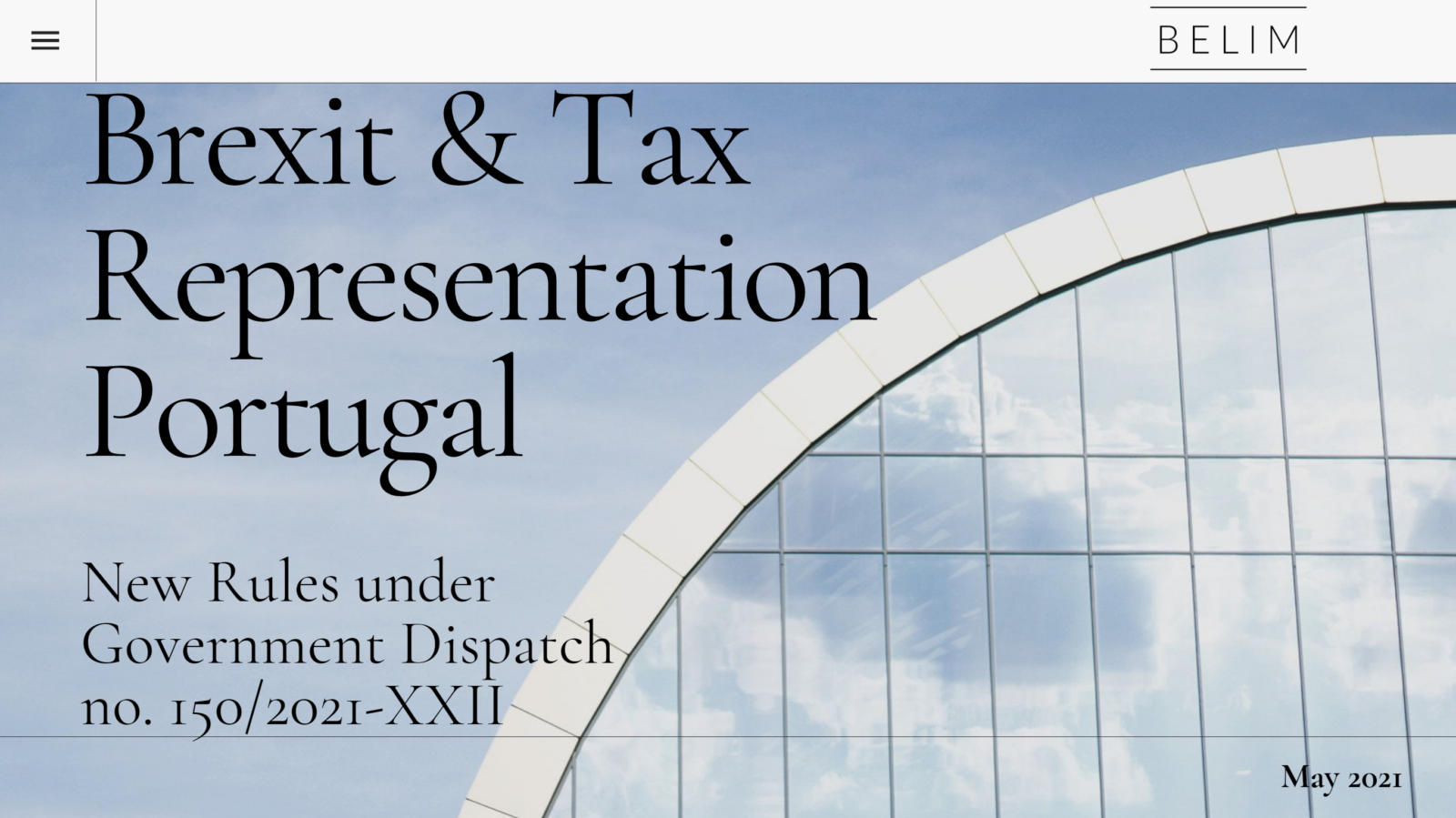- Knowledge Institute
- Publications
- Abreu Channel
- Documentary
- Breaks barriers
- Our History
- From our Stylebook
- Awards & Recognitions
- National Network
- International
- Cultural Project
- Environmental
- Organisations that we are part of
- Sustainability Reports
- Subscribe our newsletter
- For urgent enquiry please call

Practice Areas : Tax

Brexit: all you need to know about tax representation in Portugal
Following the withdrawal of the UK from the EU and the end of the transition period, individuals – individuals or legal persons – who are tax residents in the UK and have a Portuguese taxpayer number as non-resident need to proceed with the appointment of a tax representative in Portugal
In this context, please find below a description of the process relating to the appointment of a tax representative:
I. Individuals
A) individuals who were tax residents in the uk at the time they obtained a portuguese taxpayer number.
Individuals who were tax residents in the UK at the time they obtained a Portuguese taxpayer number need to appoint a tax representative in Portugal until 30.06.2021, which can be done without any penalty.
Until 30.06.2021 or until the appointment of the tax representative (if earlier) all tax notifications will continue to be sent to the current address in the UK.
How to appoint a tax representative
Individuals may appoint a tax representative through one of the following ways:
a) by accessing their personal page at the Portuguese tax authorities’ website ( Portal das Finanças ):
- Todos os serviços > Dados Cadastrais > Representante > Entregar Nomeação > Select IRS / IRS e IVA, should the individual undertake a professional activity in Portugal;
b) by means of presentation of a proxy by the future tax representative:
- In this case, the tax representative shall present a proxy, through “e-balcão” (the Portuguese tax authorities electronic service);
- In order to do so, the tax representative shall access “e-balcão” and select the following options:
– In case the individual does not undertake a professional Activity in Portugal: Imposto ou área > Registo de Contribuintes > then at “Tipo de questão” > Atividade > and in “Questão” > Representante IVA/IRC/Cess.
– In case the individual undertakes a professional activity in Portugal: Imposto ou área > Registo de Contribuintes > then at “Tipo de questão” > Identificação > and in “Questão” > Representação Fiscal
c) at the Tax Authorities’ office
- both the non-resident individual and the tax representative may, respectively, appoint and accept the appointment at the tax authorities’ office, although the tax representative may, alternatively, execute this appointment and accept it upon presentation of the proxy.
B) Individuals who become now tax residents in the UK
Foreign individuals who become tax residents in the UK need to proceed with the appointment of a tax representative under the general terms, i.e., right after changing their tax residency to the UK.
Portuguese citizens who become tax residents in the UK need to proceed with the change of their address on their Citizenship Cards and need to appoint a tax representative using one of the aforementioned processes.
II. Legal person
A) entities who were already tax residents in the uk.
The appointment of the tax representative can be done:
a) by accessing the entity’s page at the Portuguese tax authorities’ website ( Portal das Finanças ):
- Todos os serviços > Dados Cadastrais > Representante > Entregar Nomeação > Select “IVA e IRC”.
b) by means of presentation of a proxy by the future tax representative:
– In case the entity does not undertake an activity in Portugal: Imposto ou área > Registo de Contribuintes > then at “Tipo de questão” > Atividade > and in “Questão” > Representante IVA/IRC/Cess.
– In case the entity undertakes an activity: Imposto ou área > Registo de Contribuintes > then at “Tipo de questão” > Identificação > and in “Questão” > Representação Fiscal
- both the non-resident entity and the tax representative may, respectively, appoint and accept the appointment at the tax authorities’ office, although the tax representative may, alternatively, execute this appointment and the accept it upon presentation of the proxy.
B) Entities who become tax residents in the UK
Entities which become tax residents in the UK need to appoint a tax representative upon changing their tax residency
III. Final Note – Statement of Beginning of Activity
Taxpayers who have their tax residency in the UK, who do not have a tax representative and who intend to submit their statement of beginning of activity shall, alongside with its submission, appoint a tax representative for the purposes of VAT and CIT/PIT (depending on the taxpayer – natural or legal person).
In both cases, the statement of beginning of activity may be submitted through “e-balcão”: Imposto ou área > Registo de Contribuintes > then at “Tipo de questão” > Atividade > and in “Questão” > Entrega início/Alter. / Cess.
Please note that the tax representative, besides having a proxy for the purposes, needs to be tax resident in Portugal and subject to VAT.
Want to know more? Subscribe our newsletter here .

Observador | What will change with the Youth PIT Regime 2025

Joana Maldonado Reis attends the conference “Understanding Superyacht & Business Jet Tax” as a speaker
Mariana Gouveia de Oliveira moderates session at the International Cambridge Forum on Transfer Pricing Law

Abreu Advogados strengthens its team with 14 new associates

Abreu Advogados maintains top positions in individual ITR World Tax 2025 rankings

Abreu Advogados strengthens its position in the ITR World Tax 2025

Abreu Advogados writes article on the tax framework for foundations in Portugal in publication of Oxford University Press

Abreu Advogados shortlisted for Tax Law Firm of the Year at the ITR EMEA Tax Awards 2024

Abreu Advogados advises energy producers that won a challenge in wind farm tax valuation case

Main tax changes for 2024 – 1st semester

Abreu Advogados again with 19 nominations in Iberian Lawyer Forty under 40

“Accelerate the Economy Programme”: Reduction of corporate income tax and more tax incentives to attract talent, internationalisation and promotion of concentration operations

Abreu Advogados advised Faurécia on a landmark judgement by the Court of Justice of the European Union

Alexandra Courela moderates panel at the Cambridge Forum on International Tax & Disputes 2024

Nuno Cunha Barnabé signs article on life insurance in Portugal after NHR regime ends

Maria Inês Assis is one of the Top 25 Europe Female Rising Stars of 2024

Jobchain secures Virtual-Asset Services Provider License from the Bank of Portugal

Sara Soares speaks at AIJA’s Annual Tax Conference

Alexandra Courela speaker at the 24th Annual U.S. and Europe Tax Practice Trends conference

Abreu Advogados featured in the latest Legal 500 ranking

Abreu Advogados once again recognised in Chambers Europe 2024 ranking

Alexandra Courela shortlisted for the Chambers DEI Awards 2024

Susana Duarte speaks at Webinar in association with RocaJunyent

Non Habitual Resident and the new impatriate regime

Leaders League 2024 highlights Abreu Advogados

Nuno Cunha Barnabé analyses the current economic situation in Portugal in the Financial Times

OE2024 | NRH, “Programa Regressar” and investment

CMVM Implements the ‘CMVM’s Electronic One-Stop Shop’ – CMVM’s New Communication Channel

Abreu Advogados signs Legal 500 Country Comparative Guides 2023 on tax law

Abreu Advogados remains in the Top 3 Portuguese firms in ITR World Tax 2024

Joana Maldonado Reis speaker at the “Understanding Superyacht & Business Jet Tax” Conference

State Budget 2024 | Highlights

Nuno Cunha Barnabé speaker at “STEP Europe Conference 2023” in Brussels
Abreu Advogados receives 19 nominations in Iberian Lawyer Forty under 40

Abreu Advogados advises Transcom on the acquisition of Timeframe

Abreu Advogados strengthens its position in the Legal 500 with seven new additions

Abreu Advogados once again distinguished by Chambers Europe 2023
Nuno Cunha Barnabé comments on the end of the Golden Visas

2023 Portuguese State Budget | Crypto-Assets Taxation

Abreu Advogados with a strengthened position in Best Lawyers
How Can We Help?
I'm a client.
- First Name *
- Last Name *
- Please describe your enquiry *
- Abreu Contact
- I have read and i understand Abreu Advogados Privacy Policy .
I'm looking for advice
- Please select the practice area Please select the practice area Competition, Regulatory and EU Litigation & Arbitration Sports Finance Tax Intellectual Property and Information Technology Public and Environment Restructuring and Insolvency Corporate and M&A Employment Criminal, Sanctions and Compliance Real Estate
Something else
- Who do you want to contact? Academy Accounts & Finance Business Development Carreers & HR Events Facility Enquiries Technology Media Enquiries Social Impact Website feedback Other

New Guidance – Brexit & Tax representation
The Portuguese Government issued new guidance postponing the appointment of tax representative to entities already registered in PT with an UK address from 30.06.2021 to 30.06.2022 .
New registers or changes of address to the UK will however be required to appoint a tax representative straightaway.
The guidance also points towards the possibility of tax representative being waived after 01.07.2022, when a new electronic notifications system is expected to be in place, for taxpayers which accept the electronic notifications.
You can find a summary of the current applicable rules here.
The Government SEAF Dispatch no. 150/2021-XXII can be consulted here.

This site uses cookies to enable our website to interact with your browser so as to provide you with better service and a more effective website. By clicking “Agree” you are consenting to the use of cookies. You may change the definitions of your Internet browser to disable cookies, but this may result in a reduced availability of the services provided in our website. To find out more, please read our Privacy Policy . I Agree

Brexit and Fiscal Representation in Portugal

Since 2002 it had been obligatory in Portugal for any non-resident person who owned property to appoint a fiscal representative to receive correspondence from the tax department and ensure that the fiscal responsibilities of clients are fulfilled – submitting the necessary tax returns and paying all taxes.
In 2011, however, the European Court of Justice ruled that EU residents could not be compelled to have fiscal representation because this obligation violated the rights of free movement of people and capital.
So what impact will Brexit have? Will British residents need to appoint a fiscal representative once again? The answer appears to be ‘yes’. The law clearly states that non-EU residents with assets in Portugal must appoint a fiscal representative. The onus is on taxpayers to be aware of and to comply with the law.
EU residents can opt to have their tax department correspondence (including their property tax bills) sent to their EU address, but British residents without a fiscal representative may, in the future, find that their correspondence is retained by the Lisbon tax office because it can no longer be sent to the UK.
Notifications from the tax office generally require a prompt response within 10 to 15 days. Non-receipt of such correspondence can therefore swiftly lead to tax problems for an individual. Non-receipt of property tax bills can lead to non-payment and the incurrence of fines and penalty charges. Ultimately a property in Portugal could even be subject to seizure by the tax department and sold for debt recovery.
It is for this reason that non-EU residents are required to appoint a fiscal representative in order to receive their correspondence and be responsible for their fiscal matters in Portugal.
Sovereign – Consultoria Lda has been able to build very close relationships with local tax departments and other institutions. This enables us to keep up to-date with the ever-changing fiscal demands placed on resident and non-resident clients.
For more information please contact Sovereign on [email protected]
The information provided in this article does not constitute advice and no responsibility will be accepted for any loss occasioned directly or indirectly as a result of persons acting, or refraining from acting, wholly or partially in reliance upon it. © Sovereign Media (IOM) Limited 2020
W: https://www.sovereigngroup.com/portugal/
- Previous Newsletters
- Algarve Oil
- Madeleine McCann
- Ria Formosa
- Submarine case
- Algarve Real Estate Agents
- Algarve Legends
- Algarve Markets
- Algarve Towns & Villages
- Algarve Wine Guide
- Art & Culture
- Clubs & Associations
- Environment
- Food & Wine
- Health & Beauty
- Home & Family
- Old Portuguese Stuff
- Portugal in Statistics
- Public Holidays
- Readers' Views
- Thoughts from Porto...
- World Affairs
- What's Happening?
- Charity News

- Buying a property in Albufeira
- Buying a property in the Algarve
- Buying a property in Cascais
- Buying a property in Lagos
- Buying a property in Madeira
- Buying a property in Porto
- Buying a property in Tavira
- Buying a property in Vilamoura
- Property Search
- A step-by-step process of buying property in Portugal
- How to get a mortgage in Portugal as an international buyer
- Estate agents in Portugal
- Completing your property purchase in Portugal
- Where to find affordable property in Portugal
- Can I buy property in Portugal?
- Where to buy in Portugal
- An introduction to Portuguese property taxes
- Hiring a lawyer
- Why buy a property in Portugal?
- The legal requirements buying property in Portugal
- How to find a mortgage broker in Portugal
- How to find a property in Portugal
- The costs of buying property in Portugal
- Making an offer on a property in Portugal
- Managing Your Portuguese property
- Money saving tips for Portuguese property
- Property surveys in Portugal
- Residency requirements for property buyers in Portugal
- Retire to Portugal
- The potential pitfalls of buying property in Portugal
- The types of properties in Portugal
- Visas & residency options for non-residents in Portugal
- Investing in Portuguese property
- Healthcare in Portugal
- Travel and Transport
- Education in Portugal
- Learning the Language
- Legal Matters
- Top Tips for Settling in Portugal
- Finding tradespeople in Portugal
- Finding work
- Homesickness when you move to Portugal
- Getting Connected
- Pets in Portugal
- Culture and Customs
- Food and Drink in Portugal
- Sport in Portugal
- Shopping in Portugal
- Moving to Portugal
- Property Purchase Costs in Portugal
- Inheritance and succession law
- Your pension in Portugal
- Insurance in Portugal
- Why use a currency specialist?
- Regular Payments to and from Portugal
- Free Expert Currency Guide
- Letting your Portuguese Property
- The Cost of Living in Portugal in 2024
All you need to know about appointing a tax representative in Portugal
Since leaving the European Union, the UK is now considered a “third country”. As a result, it is now a legal requirement for all non-residents of Portugal who own property, hold a bank account or have a business there to appoint a tax representative. If you don’t, you could face fines of up to €7,500 – scary, right? But don’t panic – the deadline for finding a tax representative has been extended until 30 June 2022, thanks to Covid-19 disruption, so you still have plenty of time.
What about if you are looking to buy a property in the near future? Does this extended deadline still apply to you? Here is all you need to know regarding tax representatives in Portugal…
Download our Emigration Guide , with all the information you need in one place about moving overseas.
What does a tax representative do.
So, what do tax representatives actually do? Well, they are basically the middleman between you and the Portuguese Tax Department. It is their job to inform you about your tax obligations, laws and any deadlines, and to ensure you meet them! Ultimately, they will make sure you do not incur fiscal infractions and fines.

All non-residents of Portugal who own property, hold a bank account or have a business there must appoint a tax representative.
Who needs a tax representative?
All non-residents of Portugal who own property, hold a bank account or have a business there must appoint a tax representative. This includes those who live outside of Portugal for more than six months and one day.

Who does the extended deadline apply to?
The extended deadline of 30 June 2022 only applies to people who already own a property, have opened a bank account, or run a business in Portugal and have not yet appointed a tax representative.
If you are thinking about buying a property in Portugal, you must appoint a tax representative BEFORE you get a Portuguese fiscal number. You will have 60 days from when your fiscal status changes to find your tax representative.
The rules say all non-residents who earn taxable income in Portugal need a tax representative. Do I still need one if I own a property but do not rent it out?
The short answer: yes. If you pay taxes on your property, this counts as deriving income from a Portuguese source.

If you pay taxes on your property, this counts as deriving income from a Portuguese source.
How do I appoint a tax representative?
There are multiple ways of appointing a tax representative. One way is to do it online via the Portuguese Finance Portal , or if you’d prefer to do it in person, you can visit your local tax office.
Who can be my tax representative?
In theory, your tax representative can be any individual or business with a fiscal address or head office in Portugal. So, you could use a family member or a friend who are resident in Portugal, however, they must be willing to accept responsibility of receiving communications and dealing with your taxes.
Alternatively, you can use an accountant, solicitor or a lawyer.
A good lawyer is worth their weight in gold. Get in touch with one of our carefully selected legal partners today.
How much will it cost to appoint a tax representative.
If you choose to use a professional service, prices will vary, but in general you will have to pay a registration fee and ongoing annual fees. Often, you will not have to pay an annual fee in the year that you register with your tax representative.
Recent News

Portugal seeks to become a tax haven for young people

Property buyers flock to Portugal from US and UK

Why Portugal’s tourism boom is good news for property owners

Upgrades on the cards for the Algarve train line

Affordable luxury homes in Portugal: a dream destination for all
Recent articles.

Cascais: a seaside haven 20 minutes from Lisbon

Beyond the Algarve: Portugal’s best golf courses

5 brilliant beach towns in Portugal for retirees

How to keep your Portuguese property shipshape

The Portugal Buying Guide is designed to support you through each stage of buying property in Portugal, providing relevant, up-to-date information and tips from Portugal property experts and expats who have been through the process themselves. It helps you to:
✔ Impact of Brexit ✔ Find your property ✔ Ask the right questions ✔ Avoid losing money ✔ Avoid the legal pitfalls ✔ Move in successfully
Download your free guide to buying abroad
- Title * Mr Mrs Miss Ms Dr
- First Name *
- Last Name *
- Telephone Number *
- Region of interest *
- Budget for your purchase * Please select: Under £100,000 £100,000 - £199,999 £200,000 - £299,999 £300,000 - £399,999 £400,000 - £499,999 Over £500,000
- When do you intend to buy? * Please select: 0-3 months 3-6 months 6-12 months Over a year Already purchased No longer buying
- How are you funding your purchase? * Please select: Funds are in place, I am ready to buy Some funds available, but we require mortgage/equity release Funds still tied up e.g. I need to sell a property first
- I would like to register for the next virtual property event
We handle your data with care and only ever as outlined in our Privacy Policy .
- Email This field is for validation purposes and should be left unchanged.
Privacy Overview
Pin it on pinterest.

The end of the transition period for Brexit on 31 st December 2020 brings old requirements as the need of having a Portuguese tax representative for UK residents holding a Portuguese tax number.
An order was issued by the Secretary of State for Tax Affairs (Order 514/2020) regarding the need to appoint a tax representative, by individual taxpayers and entities who are tax resident in the UK, as from 1 st January 2021. This obligation is also required for UK residents that wish to register as self-employed and must appoint a VAT representative resident in Portugal.
As well, all UK residents’ holders of Portuguese tax numbers must update their tax information with the Portuguese tax authorities by appointing a fiscal representative until 30 June 2021, as penalties will apply for those not complying with such obligation.
April 2021 Edge International Lawyers
Acquiring Portuguese nationality through marriage is one of the mechanisms provided for by the Nationality Law.
The Portuguese Government has announced that as of yesterday, the Civil Registry Office has a new digital platform to receive and process citizenship applications.
Today’s “Financial Times” Edition brings much anticipated news on the reintroduction of tax breaks for new tax residents in Portugal.

After Brexit do I need a Fiscal representative in Portugal?
Last update from May 2021!
The period for nominating a fiscal representative for people living in the UK and with a Portuguese NIF number has been extended to 30th June 2022.
This does not apply to address changes to the UK neither to people requesting a NIF for the first time.
Find here the link to Portugal Tax office document outlining the latest Fiscal Representation rules and updates
The biggest change for UK expats since Brexit is regarding Fiscal representation in Portugal.
The United Kingdom left the European Union on 31 January 2020. The withdrawal agreement put in place to manage the transition period between 1 February and 31 December 2020 has now come to an end.
From the 1 January 2021 all UK residents that hold a tax identification number in Portugal (número de contribuinte), as well as those who, although resident of the UK, are absent for more than six months, must appoint a fiscal representative in Portugal to act on their behalf. Due to the covid restrictions this date has been extended to 20 June 2021.
Until a fiscal representative is appointed all correspondence issued during the period prior to the appointment of the representative in Portugal, will be sent by the Tax Administration authorities to the registered address
What is fiscal representation?
All non-EU residents including UK expats who own property, hold a bank account or have any other commercial activity or interest in Portugal must by law appoint a Fiscal Representative that is registered with the Tax Department.
The Fiscal representative in Portugal must be registered on their behalf to receive any tax department correspondence and ensure compliance within the legal deadlines.
They are responsible for informing you of your tax obligations, applicable laws and deadlines. Notifications from the Tax Department generally require a prompt response within 10 to 15 days . If these obligations are not fulfilled, it may result in fines, among other penalties.
All non-EU residents must have a Fiscal Representative in place BEFORE requesting a Portuguese fiscal number.
Non-resident companies acquiring a property or setting up a branch in Portugal are required to obtain a fiscal number from the National Registry of Companies (Registo Nacional de Pessoas Colectivas) in Lisbon and must also appoint a Fiscal Representative.
The Número de Identificação de Pessoa Coletiva (NIPC) is the corporation tax reference number, VAT registration number and company registration number in one.
Many lawyers and accountants are no longer willing to represent clients in this way. Here at RHJ we work with our partner, a specialist Fiscal Representative who has been able to build very close relationships with local tax departments. We work together with the Fiscal Representative to support our clients. This allows us to keep up to-date with the ever-changing fiscal demands placed on both resident and non-resident clients.
Which EU countries require EU VAT fiscal representation?
The following EU countries require VAT fiscal representation for non-EU established businesses.
| Eu Country | Fiscal representative required? | Comments | |
|---|---|---|---|
| Austria | Yes | VAT agent required with no shared liability | |
| Belgium | Yes | ||
| Bulgaria | Yes | ||
| Cyprus | Yes | Some exemptions for direct registrations | |
| Czech Republic | Yes | ||
| Denmark | Yes | ||
| Estonia | Yes | ||
| Finland | |||
| France | Yes | ||
| Germany | Vat agent required with no shared liability | ||
| Greece | Yes | ||
| Hungary | Yes | ||
| Ireland | |||
| Italy | Yes | ||
| Latvia | |||
| Lithuania | Yes | ||
| Luxembourg | May require tax office cash deposit | ||
| Malta | Some exceptions | ||
| Netherlands | Only for import VAT licenses | ||
| Poland | Yes | ||
| Portugal | Yes | ||
| Romania | Yes | ||
| Slovakia | |||
| Slovenia | Yes | ||
| Spain | Yes | Not joint liable | |
| Sweden | Yes | Vat agent required with no shared liability |
FAQ’s :everything you need to know about Fiscal Representation
I have had my property for years, why do i now need a fiscal representative.
Financial institutions in over 100 countries around the world now collect information on their clients and their accounts and pass that data onto the clients’ country of residence. It is now more important than ever to make sure you are correctly declaring your income and paying tax in the right country. It also means that Tax Departments in Portugal are better able to enforce the law that all non-EU residents who own property or hold a bank account in Portugal must appoint a Fiscal Representative, resident in Portugal.
I have had a fiscal number for years and I do not have a Fiscal Representative. Is this a problem?
If you are wrongly registered with Financias in Portugal as being resident in Portugal for tax purposes you may be liable to declare your worldwide income in Portugal. Any Tax Department correspondence could also be sent to the wrong address. If your IMI property tax bill is sent directly by the Tax Department to your Portuguese property, you are definitely registered as being fiscally resident in Portugal!
RHJ can check your status and, if necessary, correct your registration on your behalf.
Why do I have to pay a registration fee and in subsequent years an annual fee?
A registration fee is payable because your Fiscal Representative will need to attend the Tax Department and undertake substantial administrative work to obtain your fiscal number and register as your Fiscal Representative. You will not pay an annual fee in the year you register with your Fiscal Representative but each year thereafter you will be charged an annual fee for ongoing fiscal representation.
What is not included in the annual fee?
Your Fiscal Representatives annual fee will not include the payment of taxes, submission of tax returns or time spent on research or dealing with other tax enquiries. This will be carried out by the tax and accounting team at RHJ if you have requested we act on your behalf as your Accountants.
What else can RHJ help me with in terms of fiscal matters?
Our tax and accounting team at RHJ will handle all fiscal matters including Tax Department audits on the purchase or sale of properties, submission of tax returns, declaring rental income from your Portuguese property. We have legal partners who can assist with conveyancing and any property transfer tax (IMT) and connecting legal matters.
Our team at RHJ can assist with the provision of documentation for property sales, Tax Department property registration documents, payment of municipal taxes, advice on rateable property values, debts certificates, as well as any corporate and individual accountancy services.
If you are experiencing any problems or difficulties in appointing fiscal representation, contact us today and we will put you in touch with a Fiscal Representative who will guide you through the process.
Filter by category
Trending topics.

Guide to incorporating in Portugal

I have five year residency in Portugal. I own an apartment on the Algave. I use it as a holiday home. I do not rent it. I pay council tax. Do I need a Fiscal Representative ?
If you liked this article leave a comment or reply here Cancel Reply
Save my name, email, and website in this browser for the next time I comment.
- Personal Tax Return
- Incorporation
- Strategic Business Planning
- Tax Services
- Virtual Office
- Expat Visas
- Fiscal Representation
- Portuguese NIF
- 5% Corporate Tax
- Tax Investigation Insurance

Understand more about the tax system in Portugal and how you can become tax efficient.

Looking for an investment-based visa? The Golden Visa scheme would be the best option for you!

Discover the application process, and the benefits Portugal can offer you when becoming a freelancer!

We always love receiving valuable feedback from our clients!
No thanks, I'm not interested.

Big changes for UK nationals with interests in Portugal
04 Jul 2022
Think about it. Since the UK voted to leave the EU in 2016, we have all become somewhat expert in dealing with uncertainty. Almost overnight, everything we perhaps took for granted was very much unknown. Whether it was how Brexit would affect residency, trade, healthcare or travel, it seemed that many of us gave a ‘collective shrug’ when asked about the future.
The good news is that the dust is starting to settle and we are emerging into a clearer, post-Brexit reality. Speaking of one key change, Ione Faria from Loulé-based tax firm Portutax, says, “One of the changes is the way that UK residents must now handle taxes in Portugal. Under post-Brexit rules, if you're a UK national with a bank account, property or commercial interests in Portugal, you must appoint a Fiscal Representative no later than 31st December 2022.”
What is a fiscal representative?
In simple terms, a fiscal representative in Portugal does what the name implies; they represent your personal or commercial tax interests in Portugal and liaise directly with the local tax office on your behalf. This involves assisting you by carrying out the following services:
- Payment of the IMI and AIMI property taxes – these are only sent to fiscal reps and not directly to individuals
- Preparation and submission of tax returns declaring rental income or capital gains
- Provide rental income accounting services
- Action correspondence for tax appeals, debts, property or residency registrations etc.
- Keep abreast of your tax position and obligations
Whilst Portugal’s official government offices often publish information in English, its fiscal regulations can be hard to understand, especially for non-native speakers. Loulé-based Portutax Lda has offered a range of accountancy and tax services for 20 years. Mainly serving the Algarve’s ex-pat community, its English-speaking team has seen an increase in demand for fiscal representation as well as related services like Rental Returns, Capital Gains Calculations and Non-Habitual Residency queries.
According to its CEO, Stuart Rodriguez, the Portuguese Government deadline is a real game-changer, “What we are seeing is the deadline encouraging individuals to seek fiscal representation to avoid hefty fines. Portutax has been operating in the Algarve for many years. We are part of the community and understand how things work here. Our clients come to us for uncomplicated advice and value for money.”
UK nationals who own property or have bank accounts in Portugal have until the 31st of December 2022 to find and appoint one. Failure to do so by this date can result in fines of up to €7,500. Email [email protected] or call the office on +351 289 463271
Head of Portugal
Other news articles, a complete guide to rental income taxation in portugal.
02 Oct 2024
Guide to Portugal’s 2024 NHR Scheme
22 Jul 2024
Maximising Tax Savings in Portugal: A Guide for Non-Residents
10 Jul 2024
- Print Edition
- Classifieds
- Distribution
Subscribe to our newsletter
Read today's Portuguese stories delivered to your email.
Portuguese expats no longer need tax representative
By TPN/Lusa, in Portugal , World · 13 Jun 2022, 13:03 · 0 Comments

Joining the new system of electronic tax system as of July 1 st will exempt emigrants living in countries outside the EU or European Economic Area from the obligation of a tax representative, the Ministry of Finance said today.
"Portuguese taxpayers living outside the European Union, Norway, Iceland or Liechtenstein [European Economic Area] will be able to join the new system on the Finance Portal as of July 1 st ," the Ministry of Finance said in a statement.
With this regulation, all taxpayers residing outside those countries can dispense with the need to appoint a tax representative, states the same information.
With regard to taxpayers residing in the United Kingdom, adherence to the electronic system on the Finance Portal can be made during the second half of 2022.
"Alternatively, if they choose not to adhere to this system, they may appoint a tax representative until December 31 st , 2022, without any penalty," says the Ministry of Finance, saying that the obligation to appoint a tax representative is suspended until the end of this month, regarding UK residents.
The appointment of a tax representative is mandatory for all holders of a Tax Identification Number (TIN) who are resident in countries outside the European Union (EU). Due to Brexit, this now encompasses Portuguese emigrants living in the United Kingdom.
The adherence to this system may be made on the Finance Portal .
Taxpayers resident abroad who do not maintain any legal-tax relationship with the country are now exempt from having to appoint a tax representative in Portugal, the Ministry also stated.
In a recent letter circulated on the clarification of procedures regarding the fiscal representation of non-residents, to which Lusa news agency had access, the Tax and Customs Authority (AT) details the situations in which the taxpayer is exempt from the obligation to appoint a fiscal representative.
"A citizen who, cumulatively, does not have tax domicile in Portugal or in the European Union or the European Economic Area (Norway, Iceland and Liechtenstein), does not meet the legal requirements for resident tax status, is not subject to tax in the light of the provisions of paragraph 3 of Article 18 of the LGT and is not subject to compliance with obligations or intends to exercise any rights with the tax administration, is not required to appoint a tax representative," reads the document.
"When registering and attributing a TIN to a national or foreign citizen, as a non-resident, with an address in a third country, that is, a country that does not belong to the European Union (EU) or the European Economic Area (EEA), it is not mandatory to appoint a tax representative," it continues.
The document points out that the appointment of a tax representative becomes mandatory, "if, after being attributed a NIF as a non-resident and while residing in a third country, he or she becomes the subject of a legal tax relationship, namely, if he or she owns a vehicle and/or a property registered/situated in Portuguese territory, enters into an employment contract in Portuguese territory, or exercises an activity as a self-employed person in Portuguese territory".
Similarly, "citizens who declare residence in a third country and who are subject to a tax legal relationship, must appoint a tax representative (natural or legal person)", when they have a tax relationship, i.e. if they own a car or property, have an employment contract,or are self-employed in Portuguese territory.
"In these situations, the appointment of the tax representative must be made within 15 days of the change of address to a third country," the document states.
Share this article: Share
More in Portugal

Portugal at the Forefront of Planetary Defense
In Portugal , Business - 15 Oct 2024, 12:01
Portugal’s Renewable Energy Rise
In Portugal , Environment - 14 Oct 2024, 07:01
Over the yellow mountains
In Portugal - 13 Oct 2024, 14:01
Support The Portugal News
We are proud to provide our readers from around the world with independent, honest and unbiased news for free – both online and in print. Our dedicated team supports the local community, foreign residents and visitors of all nationalities through our newspaper, website, social media and our newsletter.
We appreciate that not everyone can afford to pay for our services but if you are able to, we ask you to support The Portugal News by making a contribution – no matter how small .
You can change how much you give or cancel your contributions at any time.
Be the first to comment on this article
Related articles

NHR Tax Holders Urged to Act Now or Pay Later
In Property - 18 Oct 2024, 09:01

Tax workers on strike
In News , Portugal - 16 Oct 2024, 10:02

New income tax incentives for young workers
In News , Portugal , Business , Politics - 14 Oct 2024, 13:05

Trend to leave a tip growing in Portugal
In News , Portugal , Business - 14 Oct 2024, 12:02

Tax officials have no way of monitoring tips
In News , Business - 09 Oct 2024, 18:32

Property rental supply soars
In News , Portugal , Property - 15 Oct 2024, 17:05
Cascais traffic restrictions due to event
In News , Portugal - 15 Oct 2024, 18:02
Portugal 22nd in world pension index
In News , Portugal , Business - 15 Oct 2024, 15:03
Other Portugal Articles

Portugal’s Space Industry Soars to New Heights
In Portugal , Business - 13 Oct 2024, 12:01

Celebrating the Anglo-Portuguese News Legacy
In Portugal - 13 Oct 2024, 08:01

Portugal’s Recovery is Celebrating Success and Facing Future Challenges
In Portugal - 11 Oct 2024, 10:01

The finite future of Portugal’s Golden Visas & the investors behind the programme
In Portugal , Business - 10 Oct 2024, 14:31

The Digital Nomad Visa D8 is still trending in 2024
In Portugal , Business - 08 Oct 2024, 12:31

A Bright Economic Outlook
In Portugal - 08 Oct 2024, 07:01
Send us your comments or opinion on this article.
Available languages
- Create Account
Brexit: all you need to know about tax representation in Portugal

If you have any questions, feel free to let us know. Our specialists will get back to you within 24 hours.
Brexit and Fiscal Representation in Portugal
In 2002 it became obligatory for non-resident individuals or companies, who owned property in Portugal, to appoint a fiscal representative to receive tax department correspondence and to ensure fiscal compliance.
In 2011, the European Court of Justice ruled that EU nationals could not be forced to have fiscal representation, because this violated the rights of free circulation of people and capital. However many chose to retain their representative for peace of mind.
So will UK nationals who are resident in Portugal once again be required to appoint a fiscal representative after Brexit? The law clearly states that those who live outside the EU must appoint a representative, so it follows on UK residents will need to have a fiscal representative in Portugal. The onus is on taxpayers to be aware of and to comply with the law.
Currently EU residents without representation automatically receive their tax department correspondence, including their property tax bills, at their EU address.
Sovereign believes that after Brexit, tax correspondence will no longer be sent to the UK because the system is not automated to send to non-EU countries. It is therefore expected that correspondence will be retained by the Lisbon tax department, which is the office designated for EU residents who have opted not to appoint a representative. Portuguese property owners that do not receive their correspondence will potentially fail to pay their taxes or respond to notifications, risking fines and penalties. By the time the UK officially leaves the EU on 29 March, it may be too late to receive the 2019 property tax bills in the UK.
It is therefore advisable to appoint a fiscal representative to avoid possible future complications. Sovereign is offering a special deal to new UK customers by cutting the fiscal representation registration costs by 50% for those registering with them before the end of January 2019.
Since 1999 Sovereign – Consultoria Lda personnel has built a very close relationship with local tax departments and other institutions, which enables us to keep up to date with the ever changing fiscal demands placed on resident and non-resident clients. With offices worldwide, the Sovereign Group is able to assist clients with all their fiscal queries, aiming to maximise clients’ tax benefits and minimise liabilities.
For more information, contact Sovereign today.
" * " indicates required fields
Please contact us if you have any questions or queries and your local representative will be in touch with you as soon as possible.
Scan the QR code below and follow our official account!
扫描以下二维码及关注硕富麟微信公众号

WeChat ID/微信公众号: 硕富麟Sovereign
REGISTER – RESIDENCY & CITIZENSHIP FORUM IN DUBAI
Wednesday, 25 September 2024


After Brexit do I need a Fiscal representative in Portugal?
Last update from May 2021!
The period for nominating a fiscal representative for people living in the UK and with a Portuguese NIF number has been extended to 30th June 2022.
This does not apply to address changes to the UK neither to people requesting a NIF for the first time.
Find here the link to Portugal Tax office document outlining the latest Fiscal Representation rules and updates
The biggest change for UK expats since Brexit is regarding Fiscal representation in Portugal.
The United Kingdom left the European Union on 31 January 2020. The withdrawal agreement put in place to manage the transition period between 1 February and 31 December 2020 has now come to an end.
From the 1 January 2021 all UK residents that hold a tax identification number in Portugal (número de contribuinte), as well as those who, although resident of the UK, are absent for more than six months, must appoint a fiscal representative in Portugal to act on their behalf. Due to the covid restrictions this date has been extended to 20 June 2021.
Until a fiscal representative is appointed all correspondence issued during the period prior to the appointment of the representative in Portugal, will be sent by the Tax Administration authorities to the registered address
What is fiscal representation?
All non-EU residents including UK expats who own property, hold a bank account or have any other commercial activity or interest in Portugal must by law appoint a Fiscal Representative that is registered with the Tax Department.
The Fiscal representative in Portugal must be registered on their behalf to receive any tax department correspondence and ensure compliance within the legal deadlines.
They are responsible for informing you of your tax obligations, applicable laws and deadlines. Notifications from the Tax Department generally require a prompt response within 10 to 15 days . If these obligations are not fulfilled, it may result in fines, among other penalties.
All non-EU residents must have a Fiscal Representative in place BEFORE requesting a Portuguese fiscal number.
Non-resident companies acquiring a property or setting up a branch in Portugal are required to obtain a fiscal number from the National Registry of Companies (Registo Nacional de Pessoas Colectivas) in Lisbon and must also appoint a Fiscal Representative.
The Número de Identificação de Pessoa Coletiva (NIPC) is the corporation tax reference number, VAT registration number and company registration number in one.
Many lawyers and accountants are no longer willing to represent clients in this way. Here at RHJ we work with our partner, a specialist Fiscal Representative who has been able to build very close relationships with local tax departments. We work together with the Fiscal Representative to support our clients. This allows us to keep up to-date with the ever-changing fiscal demands placed on both resident and non-resident clients.
Which EU countries require EU VAT fiscal representation?
The following EU countries require VAT fiscal representation for non-EU established businesses.
| Eu Country | Fiscal representative required? | Comments | |
|---|---|---|---|
| Austria | Yes | VAT agent required with no shared liability | |
| Belgium | Yes | ||
| Bulgaria | Yes | ||
| Cyprus | Yes | Some exemptions for direct registrations | |
| Czech Republic | Yes | ||
| Denmark | Yes | ||
| Estonia | Yes | ||
| Finland | |||
| France | Yes | ||
| Germany | Vat agent required with no shared liability | ||
| Greece | Yes | ||
| Hungary | Yes | ||
| Ireland | |||
| Italy | Yes | ||
| Latvia | |||
| Lithuania | Yes | ||
| Luxembourg | May require tax office cash deposit | ||
| Malta | Some exceptions | ||
| Netherlands | Only for import VAT licenses | ||
| Poland | Yes | ||
| Portugal | Yes | ||
| Romania | Yes | ||
| Slovakia | |||
| Slovenia | Yes | ||
| Spain | Yes | Not joint liable | |
| Sweden | Yes | Vat agent required with no shared liability |
FAQ’s :everything you need to know about Fiscal Representation
I have had my property for years, why do i now need a fiscal representative.
Financial institutions in over 100 countries around the world now collect information on their clients and their accounts and pass that data onto the clients’ country of residence. It is now more important than ever to make sure you are correctly declaring your income and paying tax in the right country. It also means that Tax Departments in Portugal are better able to enforce the law that all non-EU residents who own property or hold a bank account in Portugal must appoint a Fiscal Representative, resident in Portugal.
I have had a fiscal number for years and I do not have a Fiscal Representative. Is this a problem?
If you are wrongly registered with Financias in Portugal as being resident in Portugal for tax purposes you may be liable to declare your worldwide income in Portugal. Any Tax Department correspondence could also be sent to the wrong address. If your IMI property tax bill is sent directly by the Tax Department to your Portuguese property, you are definitely registered as being fiscally resident in Portugal!
RHJ can check your status and, if necessary, correct your registration on your behalf.
Why do I have to pay a registration fee and in subsequent years an annual fee?
A registration fee is payable because your Fiscal Representative will need to attend the Tax Department and undertake substantial administrative work to obtain your fiscal number and register as your Fiscal Representative. You will not pay an annual fee in the year you register with your Fiscal Representative but each year thereafter you will be charged an annual fee for ongoing fiscal representation.
What is not included in the annual fee?
Your Fiscal Representatives annual fee will not include the payment of taxes, submission of tax returns or time spent on research or dealing with other tax enquiries. This will be carried out by the tax and accounting team at RHJ if you have requested we act on your behalf as your Accountants.
What else can RHJ help me with in terms of fiscal matters?
Our tax and accounting team at RHJ will handle all fiscal matters including Tax Department audits on the purchase or sale of properties, submission of tax returns, declaring rental income from your Portuguese property. We have legal partners who can assist with conveyancing and any property transfer tax (IMT) and connecting legal matters.
Our team at RHJ can assist with the provision of documentation for property sales, Tax Department property registration documents, payment of municipal taxes, advice on rateable property values, debts certificates, as well as any corporate and individual accountancy services.
If you are experiencing any problems or difficulties in appointing fiscal representation, contact us today and we will put you in touch with a Fiscal Representative who will guide you through the process.
- Business startup
- Life in Cyprus
- Life in Malta
- Life in Portugal
- Life in the United Arab Emirates
- Life in the United Kingdom
- Lifestyle & Education
- Travel & Relocation
- Uncategorized
Previous Post Setting up a business in Portugal: what do you need to know?
Next post d7 visa portugal: a simple guide for portuguese residency in 2021, you may also like.


Schengen Area: What You Need to Know

Portugal: changes to the rule on appointing a Tax Representative
The Portuguese Tax Authority has adjusted its requirement for non-resident taxpayers to appoint a tax representative.
Circular Letter no. 90054 of 6 June defined that appointment of a tax representative was mandatory if, after the allocation of a taxpayer number as a non-resident and as a resident in a third country, the taxpayer became subject to a tax legal relationship in Portugal. In a nutshell, anyone holding a NIF (Portuguese tax number) but with tax residence in another country, or who has been out of Portugal for more than six months, must appoint an in-country representative. (This is optional for EU or European Economic Space residents (EU, Norway, Iceland and Liechtenstein).)
This rule would apply, for example, when the non-resident taxpayer: owns an entity or property in Portuguese territory; has an employment contract in Portuguese territory; or undertakes self-employment in Portuguese territory.
Following Brexit and concerns from the high number of UK citizens with interests in Portugal, the Portuguese Tax Authority has now considered widely used technology and amended this requirement.
Circular Letter no. 90057 of 20 July states an alternative and provides clarity.
“ If the taxable person, resident in a third country, subscribes to any of the dematerialized notification channels (electronic notifications and citations system on the Tax Authority’s website or to the electronic mailbox), they are dismissed from the obligation to appoint a tax representative.”
Non-resident taxpayers are not obligated to hire a tax representative if they subscribe to the Tax Authority’s website and receive its updates and notifications.
However, taxable persons carrying out activities as an independent worker within Portuguese territory are not affected by this change – the obligation to appoint a tax representative remains. This representative must be a tax resident and must be subject to VAT.
If you have any queries on this or any other aspect of business-related Portuguese taxes, simply get in touch with our experts in Lisbon .
Contact our team today to find out exactly how we can help you
Local knowledge – international coverage.
Founded in 1979, Auxadi is a family-owned business working for multinational corporations, private equity funds and real estate funds. It’s the leading firm in international accounting, tax compliance and payroll services management connecting Europe and the Americas with the rest of the world, offering services in 50 countries. Its client list includes many of the top 100 PERE companies. Headquartered in Madrid, with offices in US and further 22 international subsidiaries, Auxadi serves 1,500+ SPVs across 50 jurisdictions.
All information contained in this publication is up to date on 2022. This content has been prepared for general guidance on matters of interest only, and does not constitute professional advice. You should not act upon the information contained in this chart without obtaining specific professional advice.No representation or warranty (express or implied) is given as to the accuracy or completeness of the information contained in this content, and, to the extent permitted by law, AUXADI does not accept or assume any liability, responsibility or duty of care for any consequences of you or anyone else acting, or refraining to act, in reliance on the information contained in this chart or for any decision based on it.
Share this article with your contacts!
Stay up to date with notifications from The Independent
Notifications can be managed in browser preferences.
UK Edition Change
- UK Politics
- News Videos
- Paris 2024 Olympics
- Rugby Union
- Sport Videos
- John Rentoul
- Mary Dejevsky
- Andrew Grice
- Sean O’Grady
- Photography
- Theatre & Dance
- Culture Videos
- Fitness & Wellbeing
- Food & Drink
- Health & Families
- Royal Family
- Electric Vehicles
- Car Insurance Deals
- Lifestyle Videos
- Hotel Reviews
- News & Advice
- Simon Calder
- Australia & New Zealand
- South America
- C. America & Caribbean
- Middle East
- Politics Explained
- News Analysis
- Today’s Edition
- Home & Garden
- Broadband deals
- Fashion & Beauty
- Travel & Outdoors
- Sports & Fitness
- Climate 100
- Sustainable Living
- Climate Videos
- Solar Panels
- Behind The Headlines
- On The Ground
- Decomplicated
- You Ask The Questions
- Binge Watch
- Travel Smart
- Watch on your TV
- Crosswords & Puzzles
- Most Commented
- Newsletters
- Ask Me Anything
- Virtual Events
- Wine Offers
- Betting Sites
- Casino Sites
Thank you for registering
Please refresh the page or navigate to another page on the site to be automatically logged in Please refresh your browser to be logged in
Portugal seeks to become a low-tax haven for people aged under 35 – including foreign workers
The portuguese government plans to slash taxes for young people to discourage locals from leaving and attract skilled foreign workers, article bookmarked.
Find your bookmarks in your Independent Premium section, under my profile

For free real time breaking news alerts sent straight to your inbox sign up to our breaking news emails
Sign up to our free breaking news emails, thanks for signing up to the breaking news email.
The Portuguese government is seeking to become a low-tax haven for young people with plans to offer under-35s a decade of tax breaks .
The centre-right government of Luís Montenegro plans to scrap a proposed 15 per cent cap on income tax for people between 18 and 35 and replace it with a progressive scheme.
Under the proposal, young people earning up to €28,000 (£23,500) a year would be completely exempted from the tax in the first year of work.
The tax burden would then gradually increase over ten years. People would be exempted from 75 per cent of the tax from the second to the fourth year, by half between the fifth and the seventh and 25 per cent from the eighth to the 10th year.
According to the Social Democratic leadership, the measures could help up to 400,000 young people struggling with rising costs and dissuade them from emigrating to other countries.

The tax relief would also apply to foreign workers.
In recent years, Portugal has become an attractive destination for foreigners fleeing expensive rents and cold weather.
In a bid to attract foreign money, the country issued “golden visas” offering residence permits in exchange for buying properties worth €500,000 or more and it introduced a tax-saving “non-habitual residency scheme” for non-nationals.
However, the increase in foreigners to cities like Lisbon has contributed to a rise in property prices, it has been claimed.
The lack of affordable housing sparked widespread protests in the summer across the country where the average annual salary is around €20,000 (£17,000) and income tax rates range from 13 to 48 per cent.
But Mr Montenegro has promised that his government would “give young people the future they deserve” with his proposed budget plans.
In May, he said: “We need young Portuguese people to seize their skills and put them to work on projects and work for the country.”
The government believes the measures would cost €645million in 2025.
Despite the financial cost, youth minister Margarida Balseiro Lopes said: “The cost to the country of having the most qualified generation ever, fleeing and leaving and emigrating, is incomparably higher than the financial cost of the measure.”
But the ambitious budget could be hindered by the main opposition before it even sees the light.
When presented in parliament last week, Mr Montenegro’s government and the Socialist Party could not reach a deal over the upcoming budget.
The prime minister insisted it is his “deep conviction” that the budget would pass, ruling out a potential crisis. However, he will have to convince MPs before the vote on the budget takes place on 31 October.
Join our commenting forum
Join thought-provoking conversations, follow other Independent readers and see their replies
Subscribe to Independent Premium to bookmark this article
Want to bookmark your favourite articles and stories to read or reference later? Start your Independent Premium subscription today.
New to The Independent?
Or if you would prefer:
Hi {{indy.fullName}}
- My Independent Premium
- Account details
- Help centre
Tax Controversy 2024
Law and practice, trends and developments.

Morais Leitão, Galvão Teles, Soares da Silva & Associados is a leading full-service law firm in Portugal, with a solid background and decades of experience. It is widely recognised as a point of reference in several branches and sectors of the law, at both national and international levels. The firm’s reputation amongst peers and clients alike stems from the excellence of the legal services provided. Morais Leitão combines unique technical expertise with a distinctive approach and cutting-edge solutions that often challenge some of the most conventional practices. The firm is headquartered in Lisbon and has additional offices in Porto and Funchal, fielding a team of more than 250 lawyers. Due to its network of associations and alliances with local firms and the creation of the Morais Leitão Legal Circle in 2010, the firm can also offer support through offices in Angola (ALC Advogados) and Mozambique (HRA Advogados).
1. Tax Controversies
1.1 tax controversies in this jurisdiction.
Most tax controversies have their origin in a tax assessment, which may be made by the tax authorities (as is the case with personal income tax and with the tax on the acquisition of immovable property, based on information disclosed by taxpayers) or directly by taxpayers (as is generally the case with corporate income tax (CIT) and value-added tax (VAT)).
Tax controversies may arise for numerous reasons, although in most cases they arise because of an alleged illegality identified by the tax authorities during an administrative tax audit that leads to additional tax assessments.
1.2 Causes of Tax Controversies
Most tax controversies arise from CIT disputes, particularly regarding the non-recognition of certain costs for CIT purposes by the tax authorities. Nonetheless, there are some pending cases related to more cutting-edge topics, such as controlled foreign corporations (CFCs), transfer pricing and the general anti-avoidance rule (GAAR).
In addition, sectoral taxes (eg, on the banking, pharmaceuticals and energy industries) that generate very high assessments have been created in recent years, giving rise to a significant number of tax disputes.
1.3 Avoidance of Tax Controversies
Binding Rulings
Taxpayers may request binding rulings from the tax authorities regarding the application of law to certain facts. Through such binding rulings taxpayers may, for instance, request advance clearance of the tax and legal qualification of certain highly complex transactions.
At the request of the taxpayer, and where duly justified, the binding ruling may be provided urgently within 75 days, as long as the taxpayer presents a proposal for the tax treatment considered applicable. A fee ranging between EUR2,550 and EUR25,500 is payable by the taxpayer to the tax authorities in such cases. If the tax authorities recognise the urgency of the matter and the binding ruling is not issued within 75 days, it is deemed that they have agreed with the proposal of the tax treatment presented by the taxpayer.
Non-urgent binding rulings are free of charge and should be given within 150 days after the submission of the request. This deadline is considered merely indicative.
Advance Pricing Agreements
As the number of transfer pricing disputes has grown significantly in recent years, another way to mitigate tax controversies is to enter into an advance pricing agreement (APA) with the tax authorities. Such agreements may be unilateral, bilateral or multilateral.
APAs give legal certainty to taxpayers when conducting transactions with related entities (including parent companies, subsidiaries or associated companies, branches and other permanent establishments), provided that taxpayers comply with the terms and conditions of the APAs in question.
1.4 Efforts to Combat Tax Avoidance
Portugal has put a number of measures to combat tax avoidance in place over the years, including:
- rules preventing the tax deductibility of payments to entities located in low-tax jurisdictions;
- interest barrier rules;
- exit tax rules; and
- a set of rules (the GAAR and its procedural provisions) that allow the tax authorities to recharacterise operations as purely fictional.
Anti-Tax Avoidance Directives
In May 2019 and July 2020, the Portuguese Parliament formally implemented the Anti-Tax Avoidance Directives I and II into Portuguese law.
Through this legislation, the Portuguese tax system adopts the common solutions defined in the context of the EU, in line with the conclusions of the final reports of the G20 and the OECD project on the erosion of the tax base and the artificial shifting of profits (BEPS) to ensure that co-ordinated measures are implemented to discourage tax avoidance practices more effectively; to ensure fair and effective taxation; and to protect tax systems, at a global level, against aggressive fiscal planning.
This legislation includes amendments to the CIT Code and to the GAAR and its procedural provisions, currently provided for in the General Tax Law and the Tax Procedure and Process Code.
In this context, however, Portugal has not yet transposed into domestic law Council Directive (EU) 2022/2523 of 14 December 2022 on ensuring a global minimum level of taxation for multinational enterprise groups and large-scale domestic groups in the Union (commonly known as Pillar Two), an obligation that should have been fulfilled by the end of 2023. The non-transposition of the Directive has already led the European Commission to notify Portugal (along with eight other EU member states), within the scope of opening an offence procedure.
1.5 Additional Tax Assessments
The taxpayer may challenge an additional tax assessment through an administrative, judicial or arbitration claim.
Tax disputes may involve both an administrative and a judicial or arbitration phase; they can start and finish as an administrative or a judicial or arbitration process, but they can also start as an administrative process that evolves into a judicial or arbitration one if the taxpayer is not satisfied with the final decision of the tax authorities.
None of these claims, by itself, suspends the foreclosure file. As a rule, the taxpayer must also pay the tax assessed or render a guarantee to suspend the foreclosure file while the claim is being heard. If the taxpayer is not successful with the administrative, judicial or arbitration award and it becomes res judicata, the foreclosure file is immediately activated and enforced.
In disputes related to additional tax assessments made by the tax authorities, the taxpayer will also be notified of an infraction procedure. Notwithstanding the possibility of immediately paying the administrative penalty or challenging the decision that determined the administrative penalty on its own merits, the law provides that this process may remain suspended until a final decision is reached in the tax dispute concerning the legality of the tax assessment. Usually, taxpayers opt for the latter alternative because the infraction file will be closed if they win the tax dispute.
2. Tax Audits
2.1 main rules determining tax audits.
Primarily, tax audits follow the general National Plan for tax and customs audits (PNAITA), which is approved every year by the government. The National Plan defines the programme of action, the criteria to be used and the taxpayers to be audited, and establishes the targets to be achieved by the different tax services.
However, other tax audits may also be initiated during the year, and the Plan should allocate specific human and material resources to tax audits not previously established. Although the National Plan is confidential, the tax and customs authorities must disclose the general criteria defined to select taxpayers and other entities that will be subject to a tax audit.
Tax audits may, therefore, be initiated following:
- the National Plan for tax and customs audits;
- European or international (eg, OECD) guidelines that tax authorities decide to enforce;
- the application of randomised methods for the selection of taxpayers;
- specific denunciations lodged before the tax authorities; or
- the verification of abnormal behaviour or parameters that do not follow from the ordinary patterns expected of a specific activity or wealth situation.
Heavily Audited Individuals and Companies
Specific taxpayers are permanently on the radar of the Portuguese tax authorities, particularly large companies and high net worth individuals (HNWI). Under the current regulations, these entities are accompanied by a special large taxpayers’ unit (LTU) that targets such entities if they meet the following criteria.
- HNWI – individuals with:
- income above EUR750,000 in a specific year;
- ownership, directly or indirectly, of wealth (including assets and rights) worth more than EUR5 million;
- a lifestyle commensurate with the above-mentioned income or wealth and/or possession of the related accoutrements; or
- a legal or economic relationship with HNWI or with companies or entities that are followed by the LTU.
- Large companies that:
- are supervised by the Central Bank or the Insurance and Pensions Funds Authority (with the exception of those that carry out the activity of insurance distribution), or that are collective investment undertakings under the supervision of the Portuguese Securities Market Commission, or if they are entities with a turnover (or total income in the case of holding companies) exceeding EUR1.2 billion or EUR2.1 billion for entities belonging to a group of companies subject to the CbC report;
- have an APA on transfer pricing matters in force;
- have a total tax bill in excess of EUR20 million per year;
- are considered relevant despite not meeting the above-mentioned criteria because of their relationship with entities that do meet the criteria; or
- make up part of a tax group for CIT purposes and any of the companies in the group meet the above-mentioned criteria.
Strategic Plan to Combat Tax and Customs Fraud and Evasion
The government also prepares and releases a triennial Strategic Plan to Combat Tax and Customs Fraud and Evasion. The current plan concerns the period 2018–20, and was extended by an addendum for 2021–2022; it remained in force in 2023, despite not being formally extended for that year, and is still being applied in 2024, since the latest report states that approximately half of the foreseen measures are still to be adopted. An annual report is presented to Parliament, setting out the relevant actions that were put in place to achieve those goals and presenting statistics on different subjects under analysis.
2.2 Initiation and Duration of a Tax Audit
As a rule, a tax audit may be initiated within the statute of limitations period, which in principle corresponds to a four-year period following the taxable event. If a criminal proceeding related to the tax audit is initiated within that period, the statute of limitations is extended and the tax authorities may make a tax assessment until the end of the year following the date on which that proceeding is closed, or a final decision becomes res judicata.
A tax audit that takes place in the taxpayer’s premises should usually be concluded in a six-month period but, in specific circumstances, that period may be extended for two additional periods of three months each. The tax audit suspends the statute of limitations period during those six months.
When a mistake that may trigger an additional tax assessment was evidenced in the tax return, the statute of limitations period decreases to three years. On the other hand, the statute of limitations period increases to 12 years when the tax authorities encounter difficulties in making additional tax assessments in the following instances:
- when the tax event that is not reported to the tax authorities in due time is connected with low-tax jurisdictions, as foreseen in the blacklist approved by the Minister of Finance; or
- when the tax event is connected with bank accounts (cash or securities) opened with a non-EU financial institution or branches located outside the EU and those accounts are not mentioned in the tax returns presented by the taxpayer.
2.3 Location and Procedure of Tax Audits
Audits may occur at the tax authorities’ headquarters or at the taxpayer’s premises. The latter inspection is the so-called external audit and usually occurs in the taxpayer’s head office or other location where the accounting ledgers are maintained; all this information (eg, inventory, assets, VAT registers, any other types of records) is currently kept on computers, but physical documents on paper still exist (eg, invoices). The minutes of board meetings and general shareholders’ meetings are provided in physical books. The tax authorities may also ask to see any specific elements or documents, and may make special visits to the taxpayers’ offices – namely to verify if the records are duly updated and/or to see inventory, etc.
The tax authorities can only make one external audit related to the same tax or the same tax year of a specific taxpayer, unless a specific grounded decision is adopted by the head of the tax services, invoking new facts.
Under their rights and powers, the tax authorities may:
- ask for all types of elements and documents that reveal the taxpayer’s situation;
- proceed with a physical inventory, including the identification and evaluation of assets;
- analyse and test all computer data and electronic archives, to check compliance matters (eg, tax return compliance or tax payments), tax accounts, tax reporting and specific operations (eg, mergers, divisions) or specific matters such as transfer pricing, the tax consolidation rules of a group or specific payments abroad, particularly to low-tax jurisdictions;
- send specific questionnaires to taxpayers or obtain specific oral statements from them;
- obtain information from other taxpayers that relates to the specific taxpayer subject to the tax audit;
- collect information from other tax authorities under EU directives, bilateral tax treaties or any other international treaties or “arrangements”; and
- in addition to all financial documentation (including invoices, receipts, credit or debit notes and banking information), also ask to see reports prepared by the taxpayer’s accountants, auditors or lawyers, although confidentiality rules may apply and prevent them from being revealed in specific cases.
As a rule, the tax authorities should make their requests in writing and, if not made under an audit within the taxpayer’s premises, through a registered letter, allowing the taxpayer to obtain and prepare its answers. Thus, the rule is that the authorities give advance notice that they are initiating a tax audit at the taxpayer’s premises (with a minimum period of five days), to give the taxpayer time to reply to a specific questionnaire.
Taxpayers are often accompanied by their legal and tax advisers during tax inspections, and companies undergoing inspection should also appoint a representative to accompany the tax auditor within the company’s premises.
2.4 Areas of Special Attention in Tax Audits
Tax audits can be general or specific. The former generally cover all types of taxes, although the most common audits only cover income taxes, VAT, real estate taxes or stamp duty. They may also be very specific, covering just one of these taxes or any other.
General tax audits are usually designed to verify the global position of a specific taxpayer, whereas specific tax audits are commonly launched to verify a particular aspect within a sector or activity (eg, to verify whether and how financial institutions are dealing with a specific stamp duty or VAT issue).
Usually, the tax authorities review the company’s accounts and review its financial accounting compliance and tax obligations. Depending on the type of tax audit (a general or a specific one), the tax authorities may ask to examine:
- samples of sale and purchase invoices to verify if they comply with VAT and CIT regulations;
- the information contained in different types of documents, reports and statements to verify if results are consistent;
- the transfer pricing documentation and the intra-group transactions, including the relationships between the company and associated companies and/or permanent establishments;
- formalities observed in specific operations (eg, neutral mergers, divisions, transfers of assets or exchanges of shares, or the transfer of a head office);
- transactions concluded with entities located in low-tax jurisdictions and, in particular, payments made to them;
- the consolidated tax return and the different returns presented by all the companies belonging to a specific group as well as the formalities that those companies are, or are not, observing;
- payments abroad and all matters related to the proper application of withholding taxes;
- intra-community VAT operations or VAT deductions, or financial operations made by financial institutions often subject to stamp duties; and
- customs matters (often related to the qualification of items).
Both formal requirements and substantive issues constitute top priorities for the tax authorities, and litigation often arises because the tax authorities consider that taxpayers have failed to observe formal requirements in order to benefit from a specific tax regime (eg, a neutral merger operation, the consolidation tax regime or a waiver of a withholding tax), or reach the conclusion that a specific operation or a sequence of operations cannot produce the tax result intended by the taxpayer, either considering a specific violation of a substantive tax rule or invoking a specific or the general anti-avoidance rule.
2.5 Impact of Rules Concerning Cross-Border Exchanges of Information and Mutual Assistance Between Tax Authorities on Tax Audits
Cross-border exchanges of information and mutual assistance between tax authorities have been increasing over the years, although the numbers are not yet very significant in some areas.
The Portuguese tax authorities’ Report of Activities that was released in 2022, referring to 2021, evidences the following requests for mutual assistance (MA) in the areas of customs/excise.
- Customs – six Portuguese requests for MA from other states, and 98 where Portugal was a recipient of requests from other states (104 in total).
- Excise – four Portuguese requests for MA from other states, and two where Portugal was a recipient of requests from other states (six in total).
- Naples Convention II – 12 Portuguese requests for MA from other states, and 26 where Portugal was a recipient of requests from other states (95 in total).
This adds up to a total of 15 Portuguese requests for MA from other states, and 190 where Portugal was a recipient of requests from other states (205 in total).
In relation to co-operation between the Portuguese tax authorities and the EC – mainly the Directorate-General for Taxation and Customs Union (DG TAXUD) and the European Anti-Fraud Office (OLAF) – in 2021, the same report states that Portugal received a total of 1,700 forms of information of significant risks that required specific analysis and treatment, and 52 specific indications of fraud and serious irregularities detected by OLAF.
Cross-border exchanges of information in relation to income taxes in 2021 may be summarised as follows:
- requests – 415 received, 282 sent;
- spontaneous – 61 received, 74 sent; and
- automatic – 1,617,250 received, 3,599,965 sent.
In 2021, under VAT EU Regulation No 904/2010 concerning administrative co-operation and the fight against VAT fraud 1,223 files were initiated concerning the exchange of information, at the request of member states, through the Central Liaison Office, participation in the Eurofisc network and participation in Multilateral Controls. Of these, 537 files originated in requests from other tax authorities and 686 in requests made by the Portuguese tax authorities.
The exchange of information between the tax authorities of different member states and their mutual assistance is obviously influencing the growth of tax audits as well as the sophistication and level of information that the Portuguese tax authorities currently have in relation to taxpayers that do business abroad and/or have cross-border connections.
2.6 Strategic Points for Consideration During Tax Audits
In general, it is important to take the following steps before and during a tax audit:
- prepare the right documentation to release to the tax inspector and be able to explain it, including all the relevant facts related to that documentation;
- know beforehand the legal and formal requirements that the tax authorities and the taxpayer should observe during the tax audit in relation to all relevant aspects (scope, duration, timetables, obligation to provide documents, how to reply to questionnaires, how and when to require deadline extensions, etc);
- evaluate the tax contingencies at an early stage and verify whether it is better to regularise the situation immediately (without penalties or with lower penalties) or how it might be possible to mitigate and reduce adverse tax and other consequences (eg, infringement or even criminal penalties);
- be assisted by a tax lawyer before the tax inspection is initiated and during its course;
- provide documentation and clarifications to the tax audit accurately; and
- decide what to say (or not to say) after receiving the tax audit draft, considering that, as a rule, the tax authorities will have the possibility to review it before issuing their final report.
3. Administrative Litigation
3.1 administrative claim phase.
In certain situations, an administrative claim is mandatory before initiating a judicial phase – namely, in situations of self-assessment, withholding taxes, payments on account of the final tax due or custom duties, when the claim is related to the origin, classification or customs value of the product.
However, in situations of additional tax assessment, the administrative claim phase is always optional.
The administrative claim should be presented in the local tax office of the area where the taxpayer is domiciled or where the tax assessment took place, or of the location of the assets; it can also be sent electronically through the tax authorities’ website. Although the administrative claim should be presented in the local tax office, it should be decided by the regional tax directorate (in Portugal, the tax authorities are made up of the central services, regional tax directorates and local tax offices). The deadline for the presentation of the claim is 120 days, counted from the first day following the termination of the deadline to pay the additional assessment, which should be around 30 days after the assessment is made. If the additional tax assessment does not give rise to an obligation to pay a certain amount of tax (for instance, the taxpayer had tax losses and the result of the additional tax assessment was a reduction of the available tax losses), the 120-day deadline to present the administrative claim should be counted from the notification of the assessment.
The procedure of the administrative claim, up to the final decision, is determined by law to be simple and without formalities. As a rule, no costs or fees are due to the administration in the administrative phase of tax litigation, but the proof is limited to the documentation made available, and the tax authorities will decide to hear witnesses in exceptional cases only. Moreover, this phase (as well as the eventual subsequent judicial phase) does not, by itself, suspend the enforcement and collection of the tax assessed, which means that to avoid the seizure of assets, the taxpayer should pay the assessment or present a guarantee to the tax authorities (the taxpayer can be released from this duty if they are able to demonstrate economic hardship or that the presentation of the guarantee will cause irreparable damage).
Finally, if the tax authorities intend to dismiss the administrative claim, they should notify the taxpayer, allowing them to react to the projected dismissal within a deadline of between 15 and 25 days. In their final decision, the tax authorities should take into consideration the reasons invoked by the taxpayer and the grounds on which they were rejected.
3.2 Deadline for Administrative Claims
Notwithstanding specific deadlines that may apply to specific administrative procedures or claims, the main rule stipulates that any tax procedure (including, therefore, an administrative claim) shall be decided within four months.
If the tax authorities do not comply with this deadline, the taxpayer may presume that the claim was tacitly denied for the purposes of appealing against that tacit negative decision. The practical effect of this rule is to speed up litigation – ie, instead of waiting for a decision from the tax authorities, the taxpayer may presume that the appeal was dismissed at the end of the four-month period and appeal to the court against that tacit negative decision.
Taxpayers frequently use this rule in a strategic move because they try to convince tax authorities at the administrative level first, and because the deadlines to lodge administrative claims fall after the deadlines to go directly to court. Accordingly, it is relatively common to see taxpayers presenting an administrative claim and, at the end of the fourth month, appealing to a court assuming the tacit denial of the claim. Instead of going to court, taxpayers can also make a hierarchical appeal against the tacit negative decision and, on the express or tacit negative decision of the hierarchical appeal, subsequently go to court.
If the tax authorities manage to decide the appeal within said timeframe, taxpayers can also go to court against an express denial of the administrative appeal.
However, whilst the deadline to lodge a judicial claim is three months (90 days in the case of arbitration) after the notification of the denial of the administrative claim or after the tacit negative decision of such claim, the deadline to present the hierarchical appeal is 30 days from the same events. According to the law, hierarchical appeals should be decided within 60 days; however, this deadline is considered merely indicative and it is frequently not complied with. Taxpayers may consider that a tacit negative decision has occurred at the end of the 60-day term for the purpose of reacting against that negative decision.
4. Judicial Litigation: First Instance
4.1 initiation of judicial tax litigation.
Judicial tax litigation is initiated with the presentation of the claim in writing to the court of first instance. The claim may be sent by mail or by electronic means through the dedicated website of the tax (and administrative) courts. The claims can be presented directly by taxpayers, unless the value of the claim exceeds EUR10,000, in which case it is mandatory to appoint a lawyer registered with the Portuguese Bar Association.
The claim has to be presented in articles, identify the act contested, and expose the circumstances of fact and the law upon which the final request is based. The value of the claim shall also be indicated. Finally, the petitioners shall indicate their witnesses and other means of proof they wish to use and, in an annex to the claim, shall attach the documentary evidence at their disposal.
4.2 Procedure for Judicial Tax Litigation
After the presentation of the claim, the court attributes a number to the case and the process is distributed to a judge, who notifies the tax authorities of the need to contest the claim within three months. The tax authorities are represented in court by a specific body called Representantes da Fazenda Pública , whose function is to represent the tax authorities in the thousands of files pending in the courts.
Although contestation is not mandatory, the tax authorities normally contest within the deadline, during which time they shall also gather the available information related to the process (the administrative file) and present it to the court.
If there is a partial revocation of the act, the tax authorities shall, within three days, notify the taxpayers to confirm, within ten days, if they want to continue with the judicial claim.
If the act is totally revoked, the tax authorities shall contact the person representing the tax authorities in court to promote the termination of the judicial claim.
After the tax authorities' response to the taxpayer’s petition, and if the litigation is related to a strictly legal matter, the judge may decide upon the claim immediately after it has passed through the Public Prosecutor in the court.
If witnesses shall be heard or other forms of proof shall be presented, such as inspections or expert hearings, the judge shall notify the parties of the relevant date to produce those forms. No more than three witnesses may be heard in relation to each fact, and the maximum number of witnesses allowed is ten. The hearing shall occur in court and the testimonials shall be duly recorded. If witnesses are resident in an area not covered by the territorial jurisdiction of the court, they may be present in the court of the area where they live and be heard and interrogated through videoconference. The claimant as well as the person representing the tax authorities may directly interrogate the witnesses.
Once the presentation of proof is terminated, the judge shall notify the parties to produce their final written allegations with a deadline of at least ten days, and no more than 30.
Finally, before the decision, the claim shall be presented to the Public Prosecutor in the court, who may pronounce on the matters under discussion. The Public Prosecutor’s opinion is not binding upon the judge.
4.3 Relevance of Evidence in Judicial Tax Litigation
In principle, the proof must be presented (in the case of documentation or witnesses) or requested (in the case of inspections or expert witness) immediately with the presentation of the claim in writing to the court of first instance. In exceptional cases it is possible to present or request such proof afterwards, mainly if it is demonstrable that it was not possible to present or request the proof earlier.
Although it is not stated as such in the law, there is a clear preference for documentary evidence in tax litigation as opposed to witness testimony or other types of proof. If there are no witnesses to be heard (and in a considerable number of cases there are not), the entire case from its beginning to its termination will occur without any personal contact between the parties and the judge, as all the contact is in writing.
If witnesses are to be heard and questioned by the judge and the parties, it is up to the judge to schedule a hearing after the tax authorities have presented their answer to the taxpayer’s petition. Both the taxpayer and the tax authorities can request the hearing of witnesses. Usually, in the tax authorities’ case, their witnesses will be their agents. Witnesses are questioned first by the judge and then by the party that has requested their hearing; they can subsequently be cross-examined by the other party.
4.4 Burden of Proof in Judicial Tax Litigation
The burden of proof rests with the party that invokes a certain fact to be proved. As a rule, the tax authorities invoke and should prove their claims in the audit report, therefore grounding the tax assessment, and it is for the taxpayer to challenge such views and refute those proofs in the administrative or judicial claim.
In criminal tax litigation, the burden of proof rests with the Public Prosecutor.
4.5 Strategic Options in Judicial Tax Litigation
From a strategic perspective, and considering the limitations established by the law of the process as well as the fundamental audi alteram partem principle, it is generally advisable for all the evidence to be presented or requested at the beginning, as well as all the legal arguments.
Settlement through an agreement whereby both the taxpayer and the tax authorities would retract part of what they are claiming is not possible. Among other motives, this is due to the fact that the law clearly states that the tax authorities’ credit (ie, the amount of tax) is not at their disposal.
Paying Upfront
The option to pay or not pay the tax while the dispute is pending is mainly a financial issue that the taxpayer has to weigh. The company’s financial accounts will benefit if the tax is paid, but if it wins the case the company will, in principle, be entitled to interest, currently at the rate of 4% per year. Taking into account the interest rate offered by banks operating in Portugal, it can be quite advantageous from a financial perspective to opt to pay the tax and then receive back the tax paid with interest. If the taxpayer opts not to pay the tax, it will have to constitute a guarantee to the benefit of the tax authorities.
In considering this option, the taxpayer has to weigh the fact that the guarantee has costs – firstly, a tax cost related to stamp duty due on guarantees and then variable costs, depending on the type of guarantee chosen (eg, bank commissions or notary costs). Moreover, the taxpayer should also consider that interest will continue to be computed while the case is pending, and will be due if the taxpayer loses the case. On the other hand, it is possible to recover this cost if the taxpayer wins the case.
Finally, the taxpayer can also opt to pay the tax in instalments; depending on the amount due, this may oblige the presentation of a guarantee.
Expert Reports
The presentation of expert reports or professors’ opinions is also something to consider. Their use will depend on the type of case. If the file includes complex non-legal matters, expert reports may be relevant to help the judge to understand the situation. In the case of complex legal matters, opinions from scholars may also be worth considering. Although these reports and opinions are not binding on the judge, they are usually taken into consideration.
4.6 Relevance of Jurisprudence and Guidelines to Judicial Tax Litigation
In litigation related to international tax matters, it is common for the courts to take into account relevant jurisprudence (mainly from the ECJ) and international guidelines (mainly the different versions of the commentaries to the OECD Model Tax Convention or to the OECD Transfer Pricing Guidelines).
5. Judicial Litigation: Appeals
5.1 system for appealing judicial tax litigation.
There are two appellate courts, the Administrative Central Court (ACC) North and the ACC South, and one Administrative Supreme Court (ASC).
The ACC South is situated in Lisbon and essentially covers the southern area of the country, while the ACC North is situated in Porto and covers the northern area of the country. The ASC is also located in Lisbon, and covers the entire country.
Whoever loses the case at first instance – the taxpayer or the tax authorities, or both in the event that both parties lose part of the case – may take the case to an ACC in the event of a disagreement over the facts and the law decided at first instance, or to the ASC in the event of a disagreement exclusively based on matters of law.
The appeal is only precluded if the value of the case (in cases challenging tax assessments, the amount of tax in litigation) is lower than EUR5,000.
In exceptional cases, the taxpayer or the tax authorities may still lodge a second appeal to the ASC, against the decision of an ACC or the ASC, based on a contradiction of a previous judgment, or may go to the Constitutional Court in cases where a constitutional issue is at stake.
If there are uncertainties as to whether a tax assessment violates EU law, the final instance court shall file a request for a preliminary ruling to the Court of Justice of the European Union. In contrast to the final instance court, the courts of first instance are not obliged to file such a request and the occasions on which such courts have opted to request a preliminary ruling voluntarily are scarce.
5.2 Stages in the Tax Appeal Procedure
The appeal is launched in the court of first instance within 30 days of a final decision, and shall include the appellant’s statements. If the appeal is admitted by the court of first instance (it is only precluded if the value of the case is lower than EUR5,000), the other party will then have 30 days to submit its response. The appeal then goes to an ACC or the ASC, where it will await a decision. Where the purpose of the appeal is to review recorded evidence, the above-mentioned deadlines are increased by ten days each.
5.3 Judges and Decisions in Tax Appeals
The ACCs and the ASC each have one chamber for tax law appeals and actions, and another chamber that deals only with administrative law appeals and actions.
The decisions of the appellate courts are rendered by the majority decision of a panel of three judges. The judges are appointed by the court randomly. If there is no unanimity, the dissenting judge may publish their reasons for the dissenting vote.
6. Alternative Dispute Resolution (ADR) Mechanisms
6.1 mechanisms for tax-related adr in this jurisdiction.
Portugal adopted an arbitration regime to settle tax disputes as an ADR mechanism in 2011. Tax arbitration courts (TACs) were created to solve domestic tax disputes regardless of whether they involve domestic, EU or international tax law.
TACs must decide cases based on the written law, being expressly prohibited from resorting to equity. In a nutshell, TACs should decide tax cases based on the same legal framework available to judicial tax courts. According to this regime, the tax authorities are bound by arbitration decisions for almost all types of tax disputes with a value of up to EUR10 million.
Mediation has not yet been established, although there are several proposals to create a specific regime in some areas.
Moreover, at the international level and where tax disputes involve relationships between states, tax arbitration becomes the ultimate resort to settle those disputes.
6.2 Settlement of Tax Disputes by Means of ADR
Under the arbitration regime, disputes are settled by TACs that can be constituted by a single arbitrator (usually for controversies of low value – up to EUR60,000) or a panel of three arbitrators (cases up to EUR10 million).
The linchpin of the tax arbitration project was deciding how the judges would be chosen/appointed by the parties involved or by a third party. If the disputed amount exceeds EUR60,000, or if the taxpayer chooses to appoint an arbitrator, the arbitration court is formed of a panel of three arbiters. Otherwise, the case will be settled by way of a decision of a single arbiter. The majority of cases are decided by a single arbitrator appointed by the Ethics Committee of the Centre for Administrative Arbitration (CAA).
Cases are initiated by a specific request being filed electronically with the CAA, indicating whether the taxpayer intends to appoint a specific arbitrator. Cases must be settled in a period of six months following the creation of the TAC, which may be extended for a further six months.
TACs receive the written arguments of both parties (first taxpayers, usually contesting a tax assessment grounded in an audit report, and then the tax authorities) and analyse the merits of the claim and hear witnesses and eventually the parties or experts, and they decide in writing.
6.3 Agreements to Reduce Tax Assessments, Interest or Penalties
Under the arbitration system, it is not possible to reach an agreement to reduce the tax assessment, the interest due or the penalties that may eventually be applied. However, in an earlier phase (usually during the tax audit), it is possible to regularise situations to reduce the interest due and/or the penalties that may potentially apply.
6.4 Avoiding Disputes by Means of Binding Advance Information and Ruling Requests
Advance rulings with binding effect may be requested from the tax authorities; see also 1.3 Avoidance of Tax Controversies .
6.5 Further Particulars Concerning Tax ADR Mechanisms
According to the current arbitration regime, cases may be submitted to TACs as follows.
- As a rule, TACs have the jurisdiction to decide on the legality or illegality of the most common tax acts or decisions.
- All cases with a value up to EUR10 million may be submitted.
- The TAC has a period of six months, eventually renewable by another six months, to provide its final decision.
- Usually, there is no possibility to appeal against a TAC decision. The absence of an appeal in respect of TAC decisions is one of the principal characteristics of the model, but there are a few exceptions that contribute to ensuring the harmonisation of court decisions and guaranteeing taxpayers' rights at the highest level:
- an appeal to the ASC whenever the TAC decision conflicts with a previous decision issued by another TAC, the ACC or the ASC, provided the same fundamental point of law is at issue; or
- an appeal to the Constitutional Court whenever the TAC’s decision denies the application of a provision based on it being unconstitutional, or applies a provision whose unconstitutionality was raised during the proceedings.
- TACs are formed by one or three arbitrators.
- The panel of three arbitrators may be chosen by the CAA; otherwise, each party chooses an arbitrator, and both choose the president.
- Although precedence is not a binding rule, a previous decision on a specific matter of law may prove to be extremely important.
- Decisions must be based strictly on law.
The OECD Multilateral Convention to Implement Tax Treaty Related Measures to Prevent BEPS (MLI) was signed on 17 June 2017 and ratified in November 2019, and Portugal deposited its instrument of ratification before the OECD on 28 February 2020. The MLI entered into force in Portugal on 1 June 2020.
Under one of the many optional clauses contained in the MLI, Portugal opted to apply the arbitration clause to settle international tax disputes; this option and the transposition of the EU Arbitration Directive (ie, Directive (EU) 2017/1852 of 10 October 2017) with the approval of Law 120/2019 of 19 September, which is even more relevant in practice, mean that arbitration is now allowed to settle this type of dispute as well.
6.6 Use of ADR in Transfer Pricing and Cases of Indirect Determination of Tax
In specific areas (eg, transfer pricing) or situations (eg, when the tax authorities calculate income through indirect methods), agreements between the parties (taxpayers and tax authorities) may be signed; see also 1.3 Avoidance of Tax Controversies .
7. Administrative and Criminal Tax Offences
7.1 interaction of tax assessments with tax infringements.
Additional tax assessments typically result from internal or external tax audit procedures conducted by the Portuguese tax authorities. Within the context of such tax inspection procedures, the tax authorities not only evaluate whether the taxpayer has made a correct assessment of the tax paid and whether the taxpayer has paid the full amount of taxes due, but also ascertain if the mistakes eventually detected correspond to tax infringements/crimes.
Therefore, the tax inspection’s final report contains:
- an assessment regarding possible inaccuracies regarding the taxes paid and the taxes and interest due; and
- an assessment regarding any tax infringements that may derive from the mistakes/significant crimes committed by taxpayers.
In these circumstances and because both assessments are made at the same time, additional tax assessments and tax infringement processes typically begin “side by side”.
However, the tax authorities may initiate an administrative tax offence process independently of a tax inspection procedure whenever there is suspicion that an administrative tax offence has taken place, and regardless of the current status of the tax assessment. The same applies to the Public Prosecutor’s Office regarding tax crimes.
If an administrative tax offence is detected, the tax authorities are competent to initiate an administrative tax offence procedure on their own. In the event of a possible tax crime being detected, the tax authorities must inform the Public Prosecutor’s Office and pass on all the information gathered during the inspection procedure.
7.2 Relationship Between Administrative and Criminal Processes
The administrative process in which the additional tax assessment is being challenged and the tax administrative offence or criminal process regarding the facts that gave rise to such additional tax assessment run in parallel. They are, therefore, independent from one another.
However, when an administrative process challenging the additional tax assessment is pending and the qualification of the facts under dispute as a tax infringement depends on the decision of that administrative process – which determines whether the additional tax assessment was legally issued and if the tax assessed is due – the tax infringement process (whether an administrative offence or a criminal one) must be suspended until a final decision on the administrative process is adopted and becomes res judicata.
7.3 Initiation of Administrative Processes and Criminal Cases
As described in 7.1 Interaction of Tax Assessments With Tax Infringements , an administrative or criminal tax offence proceeding is initiated by the tax authorities if they become aware or suspect that an administrative tax offence or a tax crime may have taken place. This awareness commonly arises within the context of tax audit procedures.
The same facts may simultaneously support an indictment in an administrative tax offence proceeding and an indictment in a criminal proceeding. When this happens, the facts are prosecuted as a crime.
If, for some reason, the same facts have given rise to an administrative tax offence proceeding and a criminal one, the first one is extinguished as soon as the defendant is notified of the criminal indictment.
There are far more cases of administrative tax offences, considering that all types of mistakes originate in a file and usually the application of a fine ( coima ). However, tax criminal law has been aggravated in the last decade, and the tax and social security authorities are using criminal sanctions far more often than in the past.
7.4 Stages of Administrative Processes and Criminal Cases
Administrative Tax Offence Proceedings
These may be divided into two main stages: the administrative stage and the judicial stage. In the first stage, the tax authorities have broad powers to investigate and to issue a formal bill of indictment against the taxpayer, if it is concluded at the end of an investigation that there are sufficient grounds and evidence to indicate that a tax offence has been committed. The grounds that give rise to additional tax assessments are usually the ones used by the tax authorities to issue such a bill of indictment.
Subsequently, the defendant may present its defence before the tax authorities.
Thereafter, the tax authorities will issue their final decision. If a conviction is rendered at that moment, that decision may be judicially challenged by the defendant. Such judicial appeal marks the beginning of the judicial stage and has suspensive effect; therefore, the decision reached by the tax authorities at that point will neither become final nor be immediately enforceable.
The judicial decision rendered by the first instance court may still be appealed to the appellate courts if the first instance court confirms the conviction previously rendered by the tax authorities.
Only the decision rendered by that appellate court would, in principle, be final and fully enforceable, unless constitutional issues are involved and an extraordinary appeal (also with suspensive effect) is presented to the Constitutional Court.
The administrative and tax courts are competent to decide on tax administrative processes.
Criminal Tax Offence Proceedings
Criminal tax proceedings usually consist of four main stages:
- an investigation stage;
- a pre-trial stage (that may or may not occur);
- a trial stage; and
- an appeal (see 7.7 Appeals Against Criminal Tax Decisions ).
Investigation stage
The investigation stage is conducted by the Public Prosecutor’s Office and has the purpose of gathering all the relevant information and evidence regarding the tax criminal offence allegedly committed. This stage typically ends with a decision of indictment or with a decision to close the investigation. Under certain circumstances, this stage may also give rise to a decision of provisional suspension of the tax criminal proceedings, where the defendants agree to comply with a number of injunctions for a period, after which time the investigation may be closed with no further action, or proceed, if the injunctions are not complied with.
Pre-trial stage
The pre-trial stage is not compulsory. It may take place if requested by the defendant, regarding facts based upon which the Public Prosecutor submitted a bill of indictment.
The pre-trial stage represents a number of preliminary judicial acts that the investigating judge intends to perform and must involve a preliminary hearing that is oral and adversarial in character, during which the Public Prosecutor, the defendant and their defence counsel may participate. It ends with a decision to arraign, with the case proceeding to the trial stage, or with a decision not to pursue the case, which brings an end to the proceedings.
Trial stage
At the trial stage, all evidence gathered by the Public Prosecutor’s Office and all evidence gathered by the defendants is brought to the first instance court to be discussed and analysed. This stage ends with the court issuing a decision, which is, in principle, appealable (see 7.7 Appeals Against Criminal Tax Decisions ).
The criminal courts are competent to decide on criminal tax offences.
7.5 Possibility of Fine Reductions
Portuguese law provides for some situations in which the taxpayers may benefit from fine waivers or reductions.
Taxpayers may benefit from a fine waiver if they have not been convicted by a final decision relating to an administrative tax offence or tax crime proceeding, nor benefited from exemption or payment of a reduced fine. The fine waiver automatically applies if it is not the non-payment of taxes that is being discussed, and if the taxpayer has, in the meantime, fulfilled the tax obligations that gave rise to the tax infraction.
If the fine is paid at the taxpayer’s request, they will benefit from a reduction of the fine, which can range from 12.5% to 50% of the minimum applicable fine, depending on the stage of the administrative tax offence proceedings.
If the defendant pays the fine before the administrative tax offence proceedings or tax inspection begins, the minimum applicable fine will always be imposed.
When the taxpayer pays the fine after one of those occurrences but before the deadline to be heard within a tax inspection, the penalty shall be reduced to 50% of the applicable fine.
The 50% reduced fine may also be applied at the request of the taxpayer before the deadline for presenting their defence within an administrative tax offence proceeding if they confess their responsibility for the infraction and regularise their tax situation.
7.6 Possibility of Agreements to Prevent Trial
Portuguese law does not allow a defendant to enter a plea bargain. Normally, plea bargains represent agreements between defendants and the Public Prosecutor’s Office whereby the defendant agrees to plead guilty and pays the tax assessed plus interest and penalties in exchange for a reduced sentence and avoiding trial.
There are no other procedures for the early resolution of criminal law offences before trial. However, if the criminal process refers to a crime for which criminal law allows no sentence, the Public Prosecutor’s Office may decide to close the case without further action (ie, no indictment and no trial) after consulting the tax authorities and with the agreement of the investigating judge.
7.7 Appeals Against Criminal Tax Decisions
The judicial decision rendered by the first instance court is generally appealable to an appellate court and has suspensive effect in the case of conviction; therefore, the decision reached by the first instance court at that point will neither become final nor be immediately enforceable.
In some exceptional cases, first instance court decisions are appealable to the Supreme Court.
To appeal against a criminal court decision, the defendant must submit a written application declaring their intention to file an appeal, together with a written appeal statement. The written application must be submitted to the first instance court, but it will be considered by the second instance court. The appeal must be submitted within 30 days after the notification of the decision issued by the first instance court.
If constitutional issues are involved, an extraordinary appeal (also with suspensive effect) may still be presented to the Constitutional Court.
7.8 Rules Challenging Transactions and Operations in This Jurisdiction
As a rule, transactions and operations that have been challenged in Portugal under the GAAR, specific anti-avoidance rules (SAAR), transfer pricing rules or anti-avoidance rules give rise to administrative tax cases in the same terms as all other tax facts (see 7.1 Interaction of Tax Assessments With Tax Infringements ); as far as is known, there have been no criminal cases involving these types of operations, but the possibility cannot be excluded if the facts were to show the existence of dolus with the evident intent of not paying the due taxes.
Therefore, in principle there are no particular procedures to address these matters.
However, the largest disputes involving such matters (in terms of the amounts involved, the number of defendants or their public notoriety) attract a great deal of media attention and public pressure to obtain convictions (which do not necessarily occur).
8. Cross-Border Tax Disputes
8.1 mechanisms to deal with double taxation.
In situations of double taxation due to additional tax assessments or tax adjustments in cross-border situations, it is common to use domestic litigation, which does not mean that the mutual agreement procedure (MAP) is not used – either as an alternative to, or together with, judicial litigation. According to the OECD statistics, 87 cases related to Portugal started in 2022 and 40 were terminated in the same year, and a total of 175 cases were pending at the end of 2022.
With regard to cases concerning transfer pricing specifically, according to the same source, 28 cases started in 2022 and five were terminated in the same year, and a total of 88 cases were pending at the end of 2022.
The Arbitration Directive and the MLI
In September 2019, Portugal published Law No 120/2019, which implemented the EU Arbitration Directive and “lays down rules on a mechanism to resolve disputes between member states when those disputes arise from the interpretation and application of agreements and conventions that provide for the elimination of double taxation of income and, where applicable, capital. It also lays down the rights and obligations of the affected persons when such disputes arise”.
According to the European Commission statistics, ten cases related to Portugal started in 2020 and five were terminated in the same year, and a total of 31 cases were pending at the end of 2020. Although the latest European Commission statistics refer to 2022 (and date from December 2023), Portugal does not seem to have submitted any data for such effect.
8.2 Application of GAAR/SAAR to Cross-Border Situations
With the publication of the 2003 update to the OECD Model Convention, Portugal introduced an observation on the Commentaries to Article 1, stating that the application of GAAR or SAAR could not prevail if they were in conflict with treaty provisions due to the rules of the hierarchy of laws in the Portuguese legal system, according to which double tax treaties (DTTs) prevail over domestic law regardless of whether the latter rules were enacted before or after the former ones. This observation was later eliminated in the 2010 update of the OECD Model Convention.
After the elimination of this observation, Portugal started to negotiate treaties allowing the application of domestic anti-abuse provisions. Regarding the application of the GAAR specifically, and taking into account that it may allow the tax authorities to recharacterise, at their discretion, the facts and operations that occurred as facts or operations of an equivalent economic result, it is argued that it could be contrary to the DTT as it may alter the taxing powers of the contracting states. However, as far as is known, this has never been challenged successfully in court.
Times are changing, however. The MLI is introducing more anti-abuse rules and includes the principal purpose test (PPT) in all conventions signed by Portugal. Moreover, Portugal has accepted the principle that tax treaties generally do not limit a state’s right to tax the residents of the same state, unless this is expressly excluded by the treaty (“saving clause”), which is intended to clarify that SAARs such as CFC rules might be compatible with the convention.
This evolution and other international trends justify taxpayers being particularly cautious in cross-border transactions whenever benefiting from tax treaty measures, although they should not feel deterred by these new rules. In practice, it is likely that the PPT will not have a significantly different impact than the GAAR.
8.3 Challenges to International Transfer Pricing Adjustments
Portuguese tax law allows for correlative adjustments. Although these adjustments can be promoted by the tax authorities in the context of DTTs that foresee such a possibility, they should generally be promoted by taxpayers since it is in their best interest to avoid the double taxation originating in the transfer pricing correction made to an associated company in another state. According to the law, the taxpayer shall present a request to the tax authorities that they make the correlative adjustment. This request has to be presented within the deadline contained in the MAP of the relevant DTT. If the tax authorities agree with the adjustment made in the other state, the correlative adjustment shall be made within 120 days after the agreement obtained with the tax authorities of the other state.
There is no information available on the number of such adjustments that have been made by the tax authorities or challenged by taxpayers. The only information available is that 28 transfer pricing cases under the MAP were initiated in 2022 and five were terminated in the same year, and that a total of 88 cases were pending at the end of 2022.
See 8.2 Application of GAAR/SAAR to Cross-Border Situations regarding the effect of the MLI on cross-border tax disputes.
8.4 Unilateral/Bilateral Advance Pricing Agreements
Whilst detailed rules on transfer pricing have been provided for in the law since 2001, APAs were only introduced in 2008. In the early years, taxpayers were reluctant to initiate APAs, but things have changed in recent years, with APAs becoming more widespread to mitigate controversies and litigation in transfer pricing matters. If the number of APAs does not grow, more tax controversies on transfer pricing matters are expected to arise. Although APAs take some time and involve a complex administrative procedure, more and more taxpayers intend to enter into this type of agreement.
The procedure to sign an APA starts with the taxpayer presenting a request to the tax authorities. If the taxpayer wants to include operations with associated enterprises that are resident in countries with which Portugal has entered into a double tax convention, they can request that the APA is bilateral or multilateral, in which case the request will be presented to the other(s) tax authorities under the MAP. The agreement reached between the tax authorities is notified to the taxpayer, to obtain its confirmation on the acceptance of such agreement. The request shall:
- contain a proposal of the methods chosen by the taxpayer;
- identify the period and operations covered;
- contain the signature of all the entities that are to be bound by the agreement;
- contain a declaration stating that the taxpayer will co-operate with the tax authorities and will not invoke any commercial or professional secrecy; and
- supply all the necessary elements so that the automatic exchange of information between the tax authorities can be put in place.
8.5 Litigation Relating to Cross-Border Situations
Taking into account the case law produced by the higher courts, the cases related to cross-border situations that generate the most litigation are those concerning withholding taxes. However, transfer pricing and residency matters are increasingly attracting the attention of the tax authorities, and several relevant court cases in this domain have recently been initiated and/or decided.
To mitigate this situation, taxpayers should have internal compliance rules in place that allow them to control these cases. Moreover, they should verify the different formalities and criteria that the implementation of EU rules and the DTT require. Particular attention should be paid to facts, documentation, compliance rules and procedures that might prevent or reduce tax contingencies.
9. State Aid Disputes
9.1 state aid disputes involving taxes.
Portugal has a sound relationship with the European Commission in state aid matters, and aims to comply with the applicable EU Treaty provisions and implementing regulations, soft law and the acquis communautaire of the European courts and of the European Commission addressed to Portugal.
The majority of cases concern atypical private enforcement matters, including legal actions against taxes, and parafiscal charges and actions by customers of the alleged aid beneficiary. State aid rules have been invoked to challenge parafiscal charges imposed on the claimants by the state, based on the argument that the proceeds from those charges were used to finance illegal state aid, or that an exemption from the charge constituted illegal state aid. For example, undertakings active in the wine sector have lodged numerous legal actions against their obligation to pay a parafiscal charge for the promotion of wine (a system that had been conditionally approved under state aid rules by European Commission Decision No 2011/6/EU).
In the past, there have been Commission investigations into Portuguese tax schemes for supposedly illegal state aid elements. In 2002, for instance, the Commission adopted a decision ruling that Portugal was using an illegal tax regime in the Azores (State Aid C 35/2002 (Ex NN 10/2010)). Portugal appealed to the ECJ (Case C-88/03) but was unsuccessful.
More recently, in a decision dated 4 December 2020, the Commission declared certain situations related to corporate and other tax exemptions for companies active in Madeira to be illegal and incompatible with state aid, ordering Portugal to recover the amounts from the beneficiaries (Case SA.21259 – Portugal, Zona Franca da Madeira, Regime III).
9.2 Procedures Used to Recover Unlawful/Incompatible Fiscal State Aid
No particular legal regime is used in these matters. Depending on the particular situation, the Portuguese tax authorities request the recovery of specific state aid as they consider appropriate. The recovery is sometimes carried out by the Portuguese tax authorities according to the usual procedures used for the request of an additional tax assessment. This leads taxpayers to try to challenge such tax assessments.
9.3 Challenges by Taxpayers
As mentioned in 9.2 Procedures Used to Recover Unlawful/Incompatible Fiscal State Aid , there have been instances of taxpayers challenging requests or additional tax assessments. However, in the past, the tax authorities and the courts have maintained that taxpayers cannot challenge such requests as a typical additional tax assessment. This is on the grounds that such requests were mere executory decisions that stem from an EU decision, which is the only decision that can be challenged in court. In other words, the prevailing view is that taxpayers can challenge European Commission decisions, but have no standing to challenge the enforcement measures taken by the national authorities, either administratively or judicially, if they do not react against them (in the European instances).
It is obviously very important to ascertain what is really considered illegal or incompatible with European law – ie, was the legal regime put forward by the state not authorised or forbidden? Conversely, if the taxpayer applied the law but did not respect the European Commission terms and conditions for such aid, they might be obliged to refund the illegal state aid received. However, if the controversy is based on facts (ie, to determine whether the taxpayer fulfilled the criteria required), domestic courts would probably have a different view on their competence to settle the dispute.
9.4 Refunds Invoking Extra-Contractual Civil Liability
There are cases pending on this subject, but no positive decisions have yet been made.
10. International Tax Arbitration Options and Procedures
10.1 application of part vi of the multilateral instrument (mli) to covered tax agreements (ctas).
Portugal opted to apply part VI of the MLI. As a result, an arbitration clause was included in 18 DTTs: 12 with EU member states (Austria, Belgium, Denmark, Slovenia, Spain, France, Greece, the Netherlands, Ireland, Italy, Luxembourg and Malta) and six with states that do not belong to the EU (Andorra, Barbados, Canada, Singapore, the United Kingdom and Switzerland).
Before the signature of the MLI and the modifications introduced by these options, Portugal only had one DTT with an arbitration clause inserted in the MAP regime (the DTT signed with Japan – Article 24). Portugal opted not to apply part VI of the MLI in respect of this DTT.
10.2 Types of Matters That Can Be Submitted to Arbitration
Portugal reserved the right to apply arbitration only in matters related to Articles 5, 7 and 9 of the OECD Model Convention, declining to apply it in cases:
- where no effective double taxation occurs;
- of fraud or any other tax crime;
- that deal with the GAAR or SAAR, including tax treaty anti-abuse rules; or
- that should be dealt with by the EU Arbitration Directive or the Arbitration Convention.
10.3 Application of the Baseball Arbitration or the Independent Opinion Procedure
Portugal reserved the right not to apply the default “final offer” arbitration procedure (“baseball arbitration”), opting instead to apply the “independent opinion” model. Although no official justification was made public, this option seems to be consistent with the position adopted by Portugal in the Arbitration Convention.
Apart from this, it should be stressed that the sole DTT with an arbitration clause (ie, the DTT signed with Japan) does not provide for a specific mode of arbitration.
10.4 Implementation of the EU Directive on Arbitration and/or the MLI
The EU Arbitration Directive (Directive (EU) 2017/1852 of 10 October 2017) has been transposed into Portuguese law. Considering the countries covered by the arbitration clause (see 10.1 Application of Part VI of the Multilateral Instrument (MLI) to Covered Tax Agreements (CTAs) ) and the fact that Portugal declined to apply the MLI arbitration procedure if the case might be dealt with by the EU Arbitration Directive or the Arbitration Convention, it seems that the latter instruments will be more relevant in practice than the MLI. Moreover, the matters that may be challenged under an arbitration procedure are much broader in the EU Arbitration Directive than in the MLI.
10.5 Existing Use of Recent International and EU Legal Instruments
Despite the fact that the MLI and the EU Arbitration Directive are very recent, European Commission statistics indicate that ten cases related to Portugal started in 2020 and five were terminated in the same year, and a total of 31 cases were pending at the end of 2020, which means that these procedures were being used immediately after the Directive’s approval and the implementation by Portuguese legislation.
10.6 New Procedures for New Developments Under Pillars One and Two
Portugal has supported the implementation of Pillars One and Two during the last years, so is expected to be one of the states involved under the rules that will be approved at international level (eg, through conventions or directives) if the projects go ahead.
For the time being, there are no Portuguese rules or drafts dealing with the envisaged rules to prevent and/or settle tax disputes as indicated in Pillar One or related to Pillar Two. However, Portugal has already ratified the MLI and adopted the domestic rules necessary to transpose the EU Arbitration Directive to settle tax disputes.
10.7 Publication of Decisions
Decisions in international arbitration proceedings are generally not published. Portugal has opted to apply the confidentiality obligation contained in the MLI (Article 23.er Nos 4 and 5). However, EU Directive 2017/1852 and the Portuguese law that implemented it establish the possibility of publication of the final decision if all parties agree, or at least the publication of a summary according to an EU standard form.
10.8 Most Common Legal Instruments to Settle Tax Disputes
International tax disputes are still generally settled under the MAPs or, more commonly, in accordance with domestic procedure rules in a litigation procedure between taxpayers and the state.
10.9 Involvements of Lawyers, Barristers and Practitioners in International Tax Arbitration to Settle Tax Disputes
As a rule, taxpayers engage lawyers/barristers during the early stages of a dispute in order to proactively manage potential risks, often even prior to the emergence of a formal dispute. On the other hand, it is rare for the state to hire independent professionals in tax disputes. Given the complexity and significance of these issues, it is advisable for both parties to seek robust legal support and strategic guidance right from the outset.
11. Costs/Fees
11.1 costs/fees relating to administrative litigation.
As a rule, litigating at the administrative level (by filing an administrative claim to the Portuguese tax authorities) has no associated fees, but the tax authorities may impose a 5% fee if the claim does not seem to be sufficiently grounded.
11.2 Judicial Court Fees
The tax litigation process involves the payment of fees that vary as follows:
- between EUR102 and EUR3,060 depending on the value of the claim;
- between EUR51 and EUR1,530 in the case of appeals, depending on the value of the appeal; and
- between EUR204 and EUR6,120 in cases classified by the courts as being particularly complex.
Where the value of the claim exceeds EUR500,000, the legal fee is not fixed but is variable between:
- EUR2,040 and EUR3,060;
- EUR1,020 and EUR1,530 in the case of an appeal; and
- EUR4,080 and EUR6,120 in the case of files classified by the courts as being particularly complex.
The court may decide not to impose this extra fee.
In general terms, taxpayers must pay the above-mentioned fees in advance (it is the cost of their initiative to litigate), except for variable legal fees. In these cases, only the minimum fee is paid in advance, and the balance is paid at the end of the case.
The tax authorities are exempted from making advance payments for legal fees, which means they will only be required to pay fees at the end of the case.
Each party is responsible for the payment of the legal fees to the court, ensuring that the court is always compensated for its involvement. However, the winning party may request a refund of the amounts paid in all instances of litigation from the party that lost.
11.3 Indemnities
There are two possible situations to address regarding the possibility of requesting an indemnity if the disputed additional tax assessment is considered absolutely void and/or null.
Where the additional tax assessment has been paid, the taxpayer will be entitled to a full refund of the tax and interest unduly paid, plus indemnity interest of 4% per year calculated on the value of that tax and interest unduly paid.
If the additional tax assessment has not been paid and the taxpayer has prevented a tax enforcement procedure from seizing their assets by providing a bank guarantee or equivalent to suspend such procedure while the additional tax assessment is in dispute, the taxpayer may request an indemnity related to the costs borne to maintain that guarantee. The guarantee must have been maintained for at least three years for the taxpayer to be entitled to an indemnity, unless the additional tax assessment resulted from an error on the part of the tax authorities.
11.4 Costs of ADR
Tax litigation in the TAC involves the payment of fees that vary between EUR306 and EUR4,896, depending on the value of the claim. Where the value of the claim exceeds EUR275,000, an extra legal fee is due, equal to EUR306 for each additional EUR25,000 or fraction thereof.
Half of the fees due are paid with the initial request for the constitution of the TAC, and the other half are due before the arbitration decision is issued (no decisions are issued without the correspondent fees being entirely paid for).
Where the arbitrators are appointed by the parties, the fees payable by the taxpayer vary between EUR6,000 for arbitration proceedings with a value up to EUR60,000 and a maximum of EUR120,000 for proceedings between EUR7.5 million and EUR10 million. In such cases, arbitration fees are entirely borne by the taxpayer and must be paid in full before the filing of the initial request for the constitution of the TAC.
12. Statistics
12.1 pending tax court cases.
First Instance
The following statistics show the number of tax court cases pending in the first instance, indicating the average number of cases attributed to a judge of first instance.
Register of tax court cases (first instance) and their status (2021)
- Pending cases as of 31 December 2021: 38,413.
- Total number of first-instance judges as of 31 December 2021: 97.
- Average number of cases per judge (2021): 396.
Source: based on information published by the Conselho Superior dos Tribunais Administrativos e Fiscai s in December 2022.
The statistics show that tax judges are still being allocated a significant number of cases despite efforts being made to reduce the number of pending cases with the recruitment of special teams for this purpose.
The following two sets of statistics reflect the number of cases pending in the second instance courts and the ASC. There was also a decrease in the level of appeal litigation.
Register of tax cases at the ACC (second instance) and their status (2021 and 2022)
- Pending cases as of 31 December 2021 – north area/Porto: 2,793; south area/Lisbon: 3,446; total: 6,239.
- Pending cases as of 31 December 2022 – north area/Porto: 2,679; south area/Lisbon: 4,272; total: 6,951.
Source: based on information published online by the Conselho Superior dos Tribunais Administrativos e Fiscais and the Direção-Geral da Política da Justiça in October 2023.
Register of tax cases at the ASC (final instance) and their status (2021 and 2022)
- Pending cases as of 31 December 2021 – tax plenary: 0; tax section: 636; customs section: 215; total: 851.
- Pending cases as of 31 December 2022 – tax plenary: 0; tax section: 633; customs section: 252; total: 885.
Source: based on information published by the Conselho Superior dos Tribunais Administrativos e Fiscais , the Direção-Geral da Pol í tica da Justiça and the Administrative Supreme Court in October 2023.
Arbitration
As for tax arbitration, 7,719 cases were initiated between July 2011 and December 2022, with an average time of conclusion of four and a half months. In 2022, 810 were initiated while 815 cases were terminated, according to the annual Tax Arbitration Report for 2022.
12.2 Cases Relating to Different Taxes
Tax Litigation by Region
The following statistics show the number of tax court cases in the different regions of Portugal initiated and terminated in 2022 in the first instance, although there is no information regarding their value or the taxes to which they relate.
- Almada: 567 cases initiated; 916 cases finalised; 1,381 pending cases.
- Aveiro: 627 cases initiated; 930 cases finalised; 2,280 pending cases.
- Beja: 267 cases initiated; 328 cases finalised; 418 pending cases.
- Braga: 1,861 cases initiated; 2,092 cases finalised; 3,920 pending cases.
- Castelo Branco: 192 cases initiated; 231 cases finalised; 1,033 pending cases.
- Coimbra: 251 cases initiated; 442 cases finalised; 928 pending cases.
- Funchal: 196 cases initiated; 227 cases finalised; 452 pending cases.
- Leiria: 919 cases initiated; 1,283 cases finalised; 2,521 pending cases.
- Lisbon: 2,548 cases initiated; 3,365 cases finalised; 11,216 pending cases.
- Loulé: 408 cases initiated; 586 cases finalised; 721 pending cases.
- Mirandela: 227 cases initiated; 295 cases finalised; 300 pending cases.
- Penafiel: 536 cases initiated; 485 cases finalised; 1,185 pending cases.
- Ponta Delgada: 71 cases initiated; 34 cases finalised; 106 pending cases.
- Porto: 1,837 cases initiated; 2,102 cases finalised; 4,785 pending cases.
- Sintra: 707 cases initiated; 1,216 cases finalised; 2,655 pending cases.
- Viseu: 369 cases initiated; 353 cases finalised; 887 pending cases.
- Total cases: 11,583 cases initiated; 14,885 cases finalised; 34,788 pending cases.
Source: based on information published by the Direcção-Geral da Política da Justiça in October 2023.
Tax Litigation Subjects
Based on the data from 2019, the majority of tax-related disputes pertained to CIT, accounting for 34% of all cases. Personal income tax disputes constituted 18.1% of the cases, while disputes over VAT made up 16.2% of the total. Property tax issues were the subject of 12.8% of the cases. Disputes related to stamp duty and property transfer tax were less frequent, representing 6.4% of the cases. Vehicle tax disputes were the least common, accounting for just 3.6% of the total cases.
The number of arbitration cases initiated every year increased until 2014, peaking at 850 new cases, and then decreased slightly until 2017, when it started increasing again. In 2015 there were 789 new cases, in 2016 there were 772 new cases, in 2017 there were 693 cases, in 2018 there were 709 new cases, in 2019 there were 718 new cases, in 2021 there were 862 new cases, and in 2022 there were 810 new cases.
Finally, based on the 2022 data, in arbitration most cases (51.2%) had a value of up to EUR60,000, 28.3% of cases had a value between EUR60,000 and EUR275,000, 7.2% had a value between EUR275,000 and EUR500,000, 6.4% had a value between EUR500,000 and EUR1 million, and only 6.9% had a value higher than EUR1 million.
12.3 Parties Succeeding in Litigation
According to the OECD statistics (compiled with tax litigation data reported to 2022), around 37% of tax court cases are decided in favour of the Portuguese tax administration.
These results do not seem different to those achieved in arbitration, according to the Administrative Arbitration Centre, based on statistics from 2022, according to which the tax authorities succeeded in 33.3% of cases (40.8% when considering the amounts in dispute) for the previous five years (2018–2022).
13. Strategies
13.1 strategic guidelines in tax controversies.
Throughout the course of a tax controversy there are many strategic options and decisions to be taken. Although each case requires its own strategic considerations, preparation and analysis, there are general guidelines that taxpayers should bear in mind. The most relevant issues include the following.
- Understanding the factual landscape of the case is crucial. It is vital to thoroughly comprehend all facts pertaining to the case, meticulously examining all relevant documents and related business affairs. This includes the business rationale behind specific transactions or conduct. Such comprehensive knowledge can be instrumental in reframing an initial perspective that might otherwise lead to a misleading conclusion.
- Legal aspects often play a decisive role, including:
- the formalities to be observed throughout the course of the process (as at an earlier stage, during the tax audit);
- the analysis of the burden of proof;
- different possible interpretations of legal provisions; and
- the proper use of all possible forms of evidence to prove alleged facts (documents, witnesses, experts, etc) or better illustrate a question of law (an option).
- Engaging a tax lawyer early on can be a game changer. A competent lawyer can help shed light on the dispute, highlight the strengths and weaknesses of a case, and chart a strategic path forward while assessing all the facts and potential legal outcomes.
- Another crucial decision for taxpayers is the selection of the appropriate avenue for resolving the tax dispute. This could be through administrative channels, judicial processes or arbitration (including potentially referring matters to the ECJ). It is critical to evaluate these options at an early stage, considering potential combinations of these routes (choosing one option initially and switching to an alternative or combination thereof, if necessary). Clearly, the “one size fits all” strategy does not apply here.
Morais Leitão, Galvão Teles, Soares da Silva & Associados
Rua Castilho 165 1070-050 Lisbon Portugal
+351 21 381 74 00
+351 21 381 74 99

Tax Controversy in Portugal: an Introduction
Property tax disputes
Taxation of wind farms, hydroelectric schemes and photovoltaic plants
The only capital tax currently in force in Portugal is a property tax (the Municipal Property Tax and the Additional Municipal Property Tax). These taxes are payable annually, usually by the owner of the property on 31 December each year.
Various rates are envisaged but, in general, such rates vary between 0.3% and 1.6% of the property's taxable value, with a rate of 7.5% having been introduced for properties owned by entities domiciled in a tax haven, as defined in the Portuguese list of black-listed jurisdictions. The application of this 7.5% rate was recently extended to properties owned by entities resident in Portugal that are controlled, directly or indirectly, by entities domiciled in a territory that is on the Portuguese list of black-listed jurisdictions.
The taxable value in most cases is the result of applying a mathematical formula that takes into account, above all, the construction area, and to which different coefficients are multiplied (namely location, comfort and age). The result of this formula is that the tax value of the property is minimally in line with its market value.
The problem is that this formula is not well suited for the valuation of “special” properties such as dams, wind farms and photovoltaic plants. Portugal has been at the forefront of renewable energy production from an early stage, first with dams and the production of hydroelectric power, then with the construction of wind farms to harness wind energy and, more recently, with the construction of photovoltaic plants to harness solar energy.
For these situations, the law stipulates that the relevant taxable asset value for the application of the tax rate is determined by the so-called cost method. However, this method is not defined in the law so the tax authorities have been valuing wind farms according to criteria that are debatable (namely the inclusion of the cost of some equipment), leading to extensive case law on the subject, favourable to taxpayers. As a result of this case law, the tax authorities have recently reformulated their criteria for determining the taxable asset value, triggering new wind farm valuation processes. However, these new processes are once again being contested en masse by the taxpayers affected, who again are not in agreement with the new criteria used by the tax administration.
The tax authorities have also started to issue assessments on dams, which the courts had expressly ruled were not taxable in the past, using the cost method, and here too extensive litigation on the subject is expected to develop.
Taxation of assets held by entities resident in Portugal controlled by entities domiciled in tax havens
Still on the subject of property taxation, the introduction of the specially increased rate of 7.5% for real estate held by entities resident in Portugal that are controlled, directly or indirectly, by entities domiciled in a tax haven has also given rise to significant litigation that is pending in the courts, because larger properties (eg, shopping centres) are often held by foreign investment funds located in London or New York which, in the majority of cases, invest in Portugal through entities domiciled in tax havens such as the Bermuda or the Channel Islands, and which are therefore covered by the higher rate.
According to the arguments that have been put forward by taxpayers in these situations, the increased rate violates, in particular, the free movement of capital enshrined in the Treaty on the Functioning of the European Union. Therefore, it is possible that this issue could still be the subject of a judgment by the Court of Justice of the European Union (CJEU) through the preliminary ruling mechanism.
Income tax disputes
Taxation related to the payment of income to non-resident entities
Along the same lines, several cases have been decided by the arbitration courts in favour of taxpayers regarding the difference in treatment between the payment of dividends by companies resident in Portugal to Portuguese UCITs that are exempt from withholding tax versus the payment of dividends by companies resident in Portugal to foreign UCITs that are subject to withholding tax.
In the international sphere, the tax authorities have been carrying out inspections with a view to refusing exemptions from withholding tax on the payment of dividends and interest to associated companies resident in other EU member states by alleging abusive arrangements under the “Danish Cases” doctrine. The only cases that have rendered decisions so far pertain to interest payments, where the arbitration courts have found in favour of the tax authorities due to difficulties on the part of taxpayers in demonstrating that the recipient of the income is the beneficial owner of such income (such requirement is explicitly contained in the Interest and Royalties Directive), also having denied the subsidiary application of double tax treaties.
Transfer pricing inspections
Although they have always been a source of tax litigation, transfer pricing inspections are changing in their nature, with the tax authorities having more access to taxpayer information than ever before. The new sources of information analysed by the tax authorities include the emails and calendars of key executives, job descriptions and evaluations, social media shares and financial data.
An incorrect, incomplete or outdated transfer pricing file can therefore imply a significant contingency in light of this more comprehensive approach. The analysis methodology used and the narrative employed can be determining factors in the event of scrutiny.
Disputes related to sectoral taxes
Many sectoral taxes have been created and renewed in recent years, and a vast body of case law has been produced, namely in regards to special taxes on the banking and energy sectors.
Taxation on the banking sector
Branches of foreign credit institutions operating in Portugal have been challenging two taxes that specifically apply to banking (the Contribution on the Banking Sector and the Additional Solidarity Tax on the Banking Sector), on the grounds of both unconstitutionality and violation of European Union law (ie, the freedom of establishment enshrined in the Treaty of the Functioning of the European Union).
The CJEU recently ruled that the latter tax was incompatible with European law, and it is possible that the same conclusion shall apply to the Contribution on the Banking Sector. In fact, according to the CJEU, branches of European Union resident companies are being discriminated against when compared to resident banks and subsidiaries of European Union resident companies due to the definition of the Additional Solidarity Tax’s taxable base, which allows for the exclusion of certain realities that branches, due to their legal nature, do not possess (such as own capital). Considering that the Contribution on the Banking Sector’s taxable base is exactly the same as that of the Additional Solidarity Tax, it would seem that the conclusions of the CJEU should extend to the first tax as well.
Such an extension, however, is likely to be met with difficulty, considering that the Portuguese Supreme Court, when confronted with the ECJ proceedings as they were ongoing, expressed multiple times, in a very formalistic approach, that the result of such proceedings was not able to influence litigation regarding the Contribution on the Banking Sector, as different taxes were at stake.
Recent decisions regarding the Additional Solidarity Tax on the Banking Sector by arbitral courts (there are no known decisions from the judicial courts as yet) have consistently ruled in favour of the regime's unconstitutionality. These rulings are currently under mandatory appeal in the Constitutional Court. In addition, said courts have already issued decisions deeming the regime incompatible with EU law, supported by the CJEU’s ruling on the matter. However at the time of writing, there is also a single decision going against this trend.
Taxation on the energy sector
Companies that have challenged this annual tax have seen their claims consistently rejected by the courts. More recently, however, the Constitutional Court has ruled that this tax is unconstitutional for a certain category of taxpayers, namely because it was created with the intention of being an extraordinary tax but has been extended over time for no apparent reason because the reasons that led to its creation have been overtaken.
However, the Constitutional Court has since issued two decisions on the matter that appear to compromise the court’s earlier position. Considering the volume of litigation on this matter, further decisions are expected to follow, hopefully consolidating the court’s understanding in favour of the taxpayer (having in mind that the Constitutional Court declares, with general binding force, the unconstitutionality or illegality of any rule, provided that it has judged it unconstitutional or illegal in three specific cases).
There has been a recent trend of the tax authorities initiating criminal proceedings to investigate possible cases normally associated with tax planning. This trend is worrying because of the intimidating nature always associated with criminal proceedings, but also because the guarantees of the defendant in criminal proceedings are not adequate for the defence of taxpayers in tax matters.
In fact, while tax cases are judged by tax courts (a constitutionally protected right), which offer more guarantees of knowledge of matters of a specifically tax nature, a criminal case of a tax nature shall be judged by criminal courts, therefore compromising the taxpayer’s right to discuss the legality of the assessment in a specialised forum.
Final notes
Taxpayers' appetite for tax litigation – either because they do not agree with the taxes they have been charged or because they identify opportunities following court rulings handed down to other taxpayers in similar circumstances – has remained high.
In order to help decongest the tax courts and reduce the time it takes to decide cases, a system has been created that allows older cases pending before the courts to be referred to tax arbitration until the end of 2024, at the taxpayers' option, which ensures a final decision within a maximum of one year. This is an exceptional arrangement that should be considered, particularly in the case of older cases, in order to obtain a speedy decision in cases that have dragged on for many years in the courts without a decision.
Familiarity with the trends and developments summarised above may help companies considering investing in Portugal to anticipate and avoid problems. One issue that has not been addressed above, but that may be relevant in the near future for individual investors, is the abrupt end of the preferential tax regime for non-habitual residents (although a grandfathering clause was put in place, preventing residents who were already benefiting from such regime from losing their status), which could lead to litigation due to frustrated expectations on the part of taxpayers.

Compare law and practice by selecting locations and topic(s)
{{searchboxheader}}, select topic(s), please select at least one chapter and one topic to use the compare functionality..
- Print Edition
- Classifieds
- Distribution
Subscribe to our newsletter
Read today's Portuguese stories delivered to your email.
Brexit and Fiscal Representation
By Advertiser, in · 18 Oct 2018, 09:49 · 0 Comments
In 2011, the European Court of Justice ruled that EU nationals could not be forced to have fiscal representation, as this violated the rights of free circulation of people and capital. However many chose to retain their representative for peace of mind. So with Brexit, will UK residents once again need to appoint a fiscal representative? The law clearly states that those who live outside the EU must appoint a representative, so it follows on that yes, UK residents will need to have a fiscal representative in Portugal. The onus is on tax payers to be aware of and to comply with the law. Currently EU residents without repre-sentation automatically receive their tax department correspondence, including their property tax bills, at their EU address. Sovereign believes that after Brexit, tax correspondence will no longer be sent to the UK as the system is automated to not send to non-EU countries. Correspondence is expected to be retained by the Lisbon tax department which is the office designated for EU residents who have opted not to appoint a representative. As property owners may not receive their correspondence, this may undoubtedly lead to some individuals not paying their taxes or not responding to notifications on time, risking fines and penalties. By the time the UK leaves the EU on 29 March it may be too late to receive the 2019 property tax bills in the UK. To avoid possible complications it is advisable to appoint a fiscal representative beforehand. Sovereign is therefore offering a special deal to new UK customers by cutting the fiscal representation registration costs by 50% for those registering with them until the end of January 2019. Since 1999 Sovereign – Consultoria Lda personnel have built a very close relationship with local tax departments and other institutions, which enables them to keep up to date with the ever changing fiscal demands placed on their resident and non-resident clients. With offices worldwide, the Sovereign Group is able to assist clients with all their fiscal queries, aiming to maximise clients’ tax benefits and minimise liabilities. Contact Sovereign today for more information.
For more information Tel: (+351) 282340480 or email: [email protected]
Share this article: Share
Luxury real extate in the central Algarve
In - 17 Jul 2020, 00:00
What a crazy year so far!
Sos uk tv for your immaculate reception, support the portugal news.
We are proud to provide our readers from around the world with independent, honest and unbiased news for free – both online and in print. Our dedicated team supports the local community, foreign residents and visitors of all nationalities through our newspaper, website, social media and our newsletter.
We appreciate that not everyone can afford to pay for our services but if you are able to, we ask you to support The Portugal News by making a contribution – no matter how small .
You can change how much you give or cancel your contributions at any time.
Be the first to comment on this article

Property rental supply soars
In News , Portugal , Property - 15 Oct 2024, 17:05
Cascais traffic restrictions due to event
In News , Portugal - 15 Oct 2024, 18:02
Portugal 22nd in world pension index
In News , Portugal , Business - 15 Oct 2024, 15:03
Other Articles
Bedrooms extra – here for you as we always have been, togofor-homes – the key to your success.
In - 26 Jun 2020, 00:00
E-Bike most popular in Europe
Think of moving to portugal, luso living - property management services, for all of your artificial grass needs.
In - 19 Jun 2020, 00:00
Send us your comments or opinion on this article.
Available languages

COMMENTS
The deadline for UK resident taxpayers to appoint a tax representative in Portugal has been postponed for one year, until 30 June 2022. By TPN/Lusa, in News, Community, Business · 14 May 2021, 01:00 · 0 Comments. In an order dated 30 April, the Assistant Secretary of State for Tax Affairs, António Mendonça Mendes, revoked another order ...
Joining the new system of electronic tax system as of July 1 st will exempt emigrants living in countries outside the EU or European Economic Area from the obligation of a tax representative, the Ministry of Finance said today. "Portuguese taxpayers living outside the European Union, Norway, Iceland or Liechtenstein [European Economic Area] will be able to join the new system on the Finance ...
Since 2002 it became a legal requirement for non-resident individuals (or companies), who have a fiscal number, to appoint a fiscal representative who would be the interface between the Finanças and the individual. Sovereign has been providing fiscal representation services ever since. In 2011, the European Court of Justice ruled that Portugal ...
A) Entities who were already tax residents in the UK. The appointment of the tax representative can be done: a) by accessing the entity's page at the Portuguese tax authorities' website ( Portal das Finanças ): Todos os serviços > Dados Cadastrais > Representante > Entregar Nomeação > Select "IVA e IRC". b) by means of presentation ...
The Portuguese Government issued new guidance postponing the appointment of tax representative to entities already registered in PT with an UK address from 30.06.2021 to 30.06.2022.. New registers or changes of address to the UK will however be required to appoint a tax representative straightaway.. The guidance also points towards the possibility of tax representative being waived after 01.07 ...
On July 8, 2022, it was published the Decree-Law 44/2022 waiving for the then existing obligation to appoint a tax representative whenever taxable persons adhere to one of the electronic notification channels provided for in Portuguese legislation. Such regulation became effective on July 9, 2022.
The answer appears to be 'yes'. The law clearly states that non-EU residents with assets in Portugal must appoint a fiscal representative. The onus is on taxpayers to be aware of and to comply with the law. EU residents can opt to have their tax department correspondence (including their property tax bills) sent to their EU address, but ...
Portuguese tax representation no longer required for non-EU residents. Jul 25, 2022 • by Sam Crawford. Up until now, anyone with a Portuguese tax number (NIF) living outside of the EU, Norway, Iceland, and Liechtenstein, were required to hire a fiscal representative, regardless of whether they have tax obligations in Portugal or not. A fiscal ...
For reliable and trustworthy fiscal representation, tailored to your unique financial situation, contact our team at Portutax via email at [email protected] or phone at +351 289 463271. A Complete Guide to Rental Income Taxation in Portugal. Maximising Tax Savings in Portugal: A Guide for Non-Residents.
If you are thinking about buying a property in Portugal, you must appoint a tax representative BEFORE you get a Portuguese fiscal number. You will have 60 days from when your fiscal status changes to find your tax representative. The rules say all non-residents who earn taxable income in Portugal need a tax representative.
The deadline for UK resident taxpayers to appoint a tax representative in Portugal has been postponed for one year, until 30 June 2022, by the Government, which plans to implement an electronic notification system by then.
The end of the transition period for Brexit on 31 st December 2020 brings old requirements as the need of having a Portuguese tax representative for UK residents holding a Portuguese tax number.. An order was issued by the Secretary of State for Tax Affairs (Order 514/2020) regarding the need to appoint a tax representative, by individual taxpayers and entities who are tax resident in the UK ...
From the 1 January 2021 all UK residents that hold a tax identification number in Portugal (número de contribuinte), as well as those who, although resident of the UK, are absent for more than six months, must appoint a fiscal representative in Portugal to act on their behalf. Due to the covid restrictions this date has been extended to 20 ...
Speaking of one key change, Ione Faria from Loulé-based tax firm Portutax, says, "One of the changes is the way that UK residents must now handle taxes in Portugal. Under post-Brexit rules, if you're a UK national with a bank account, property or commercial interests in Portugal, you must appoint a Fiscal Representative no later than 31st ...
The new rule will be in effect as of July 1st.
Brexit: all you need to know about tax representation in Portugal Following the withdrawal of the UK from the EU and the end of the transition period, individuals - individuals or legal persons - who are tax residents in the UK and have a Portuguese taxpayer number as non-resident need to proceed with the appointment of a tax representative ...
Sovereign is offering a special deal to new UK customers by cutting the fiscal representation registration costs by 50% for those registering with them before the end of January 2019. Since 1999 Sovereign - Consultoria Lda personnel has built a very close relationship with local tax departments and other institutions, which enables us to keep ...
From the 1 January 2021 all UK residents that hold a tax identification number in Portugal (número de contribuinte), as well as those who, although resident of the UK, are absent for more than six months, must appoint a fiscal representative in Portugal to act on their behalf. Due to the covid restrictions this date has been extended to 20 ...
The Portuguese Tax Authority has adjusted its requirement for non-resident taxpayers to appoint a tax representative. Circular Letter no. 90054 of 6 June defined that appointment of a tax representative was mandatory if, after the allocation of a taxpayer number as a non-resident and as a resident in a third country, the taxpayer became subject to.
The tax administration admits that the application for a tax identification number - NIF (Portuguese fiscal number) by non-residents citizens may not be carried out due to the legal requirement to appoint a fiscal representative. ... as tax representation is a way of overcoming the inability of the represented person to exercise rights and ...
The new youth tax breaks will, however, be available to non-Portuguese citizens who move to the country. The government estimates that the youth tax breaks will cost the state about €650mn a year.
Portugal is seeking to become a low-tax haven for young people as politicans hope more young people stay in cities like Lisbon (Getty Images) Your support helps us to tell the story Read more
Portugal tries to tempt under-35s with tax cuts Getty Images The plan presented by the Portuguese government could see taxes for people aged up to 35 slashed to a maximum of 15%
Sovereign is therefore offering a special deal to new UK customers by reducing the fiscal representation registration costs by 50% for those registering with them before the end of March 2020. Registration should be completed before the property tax bills are issued in April.
The Portuguese tax authorities' Report of Activities that was released in 2022, referring to 2021, evidences the following requests for mutual assistance (MA) in the areas of customs/excise. ... Chambers and Partners make no representation or endorsement of the quality and services supplied by companies or firms that may be found on this ...
With offices worldwide, the Sovereign Group is able to assist clients with all their fiscal queries, aiming to maximise clients' tax benefits and minimise liabilities. Contact Sovereign today for more information. For more information Tel: (+351) 282340480 or email: [email protected]. The views expressed on this page are those of the ...
The new youth tax breaks will, however, be available to non-Portuguese citizens who move to the country. The government estimates that the youth tax breaks will cost the state about €650 million ...